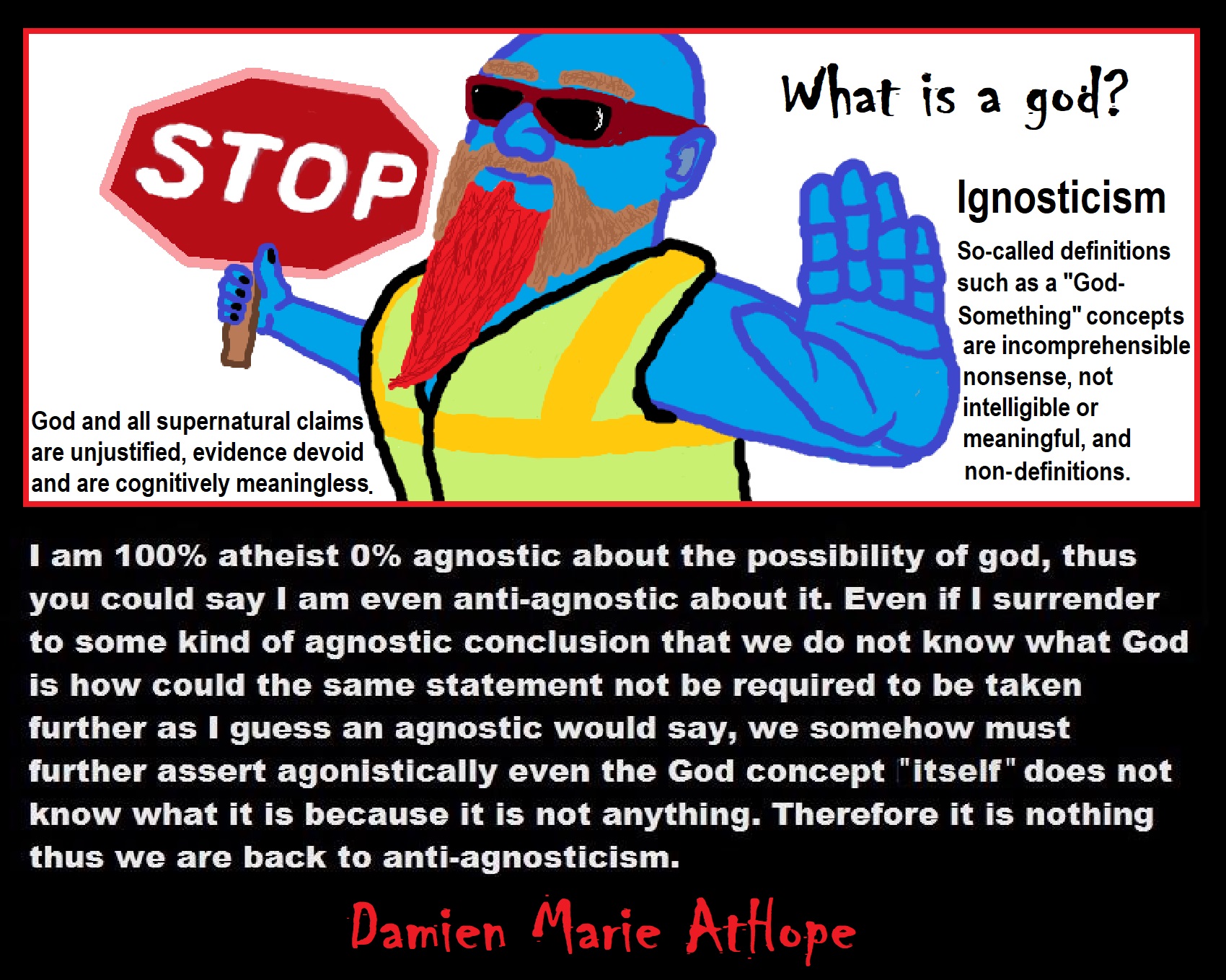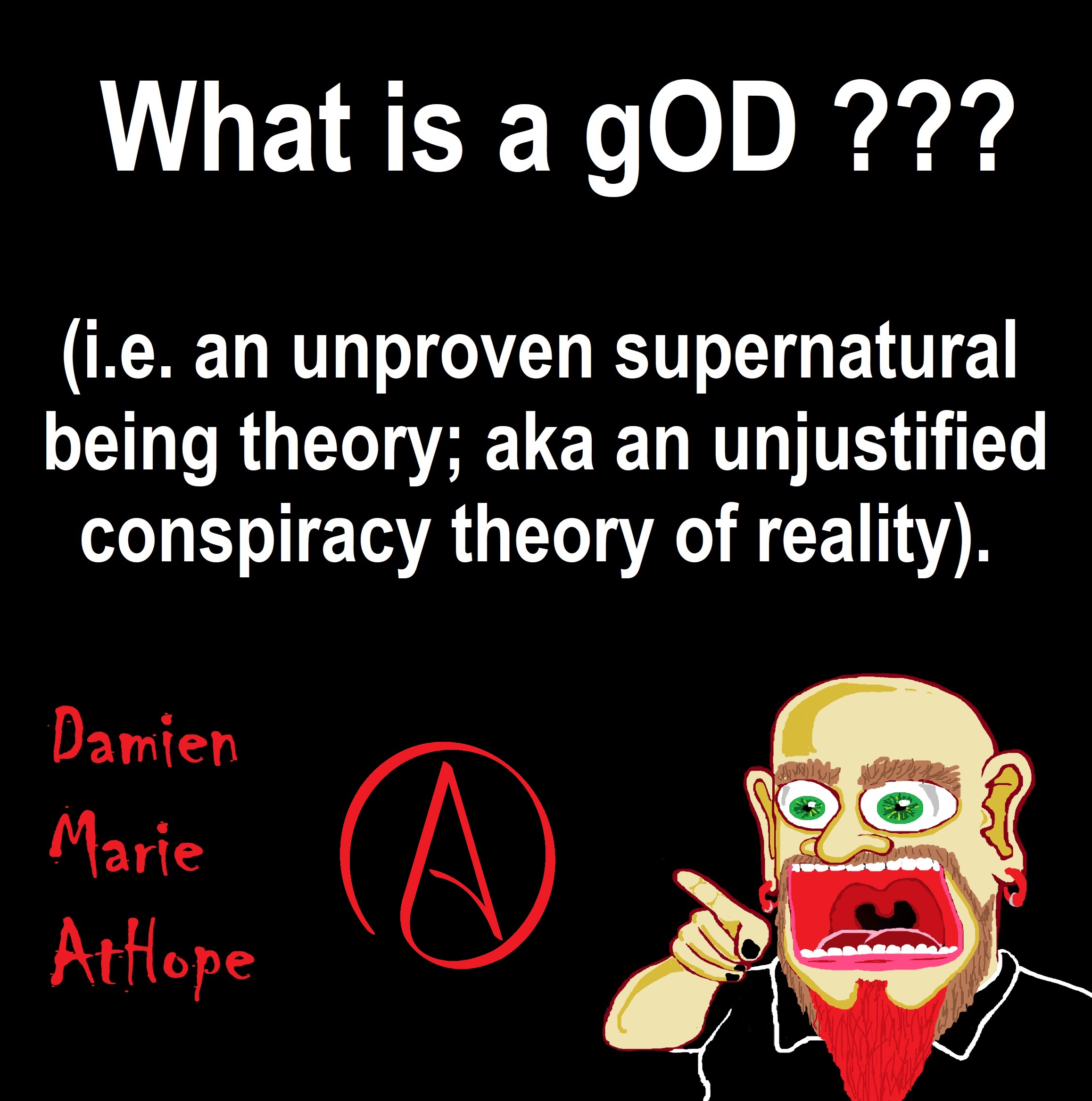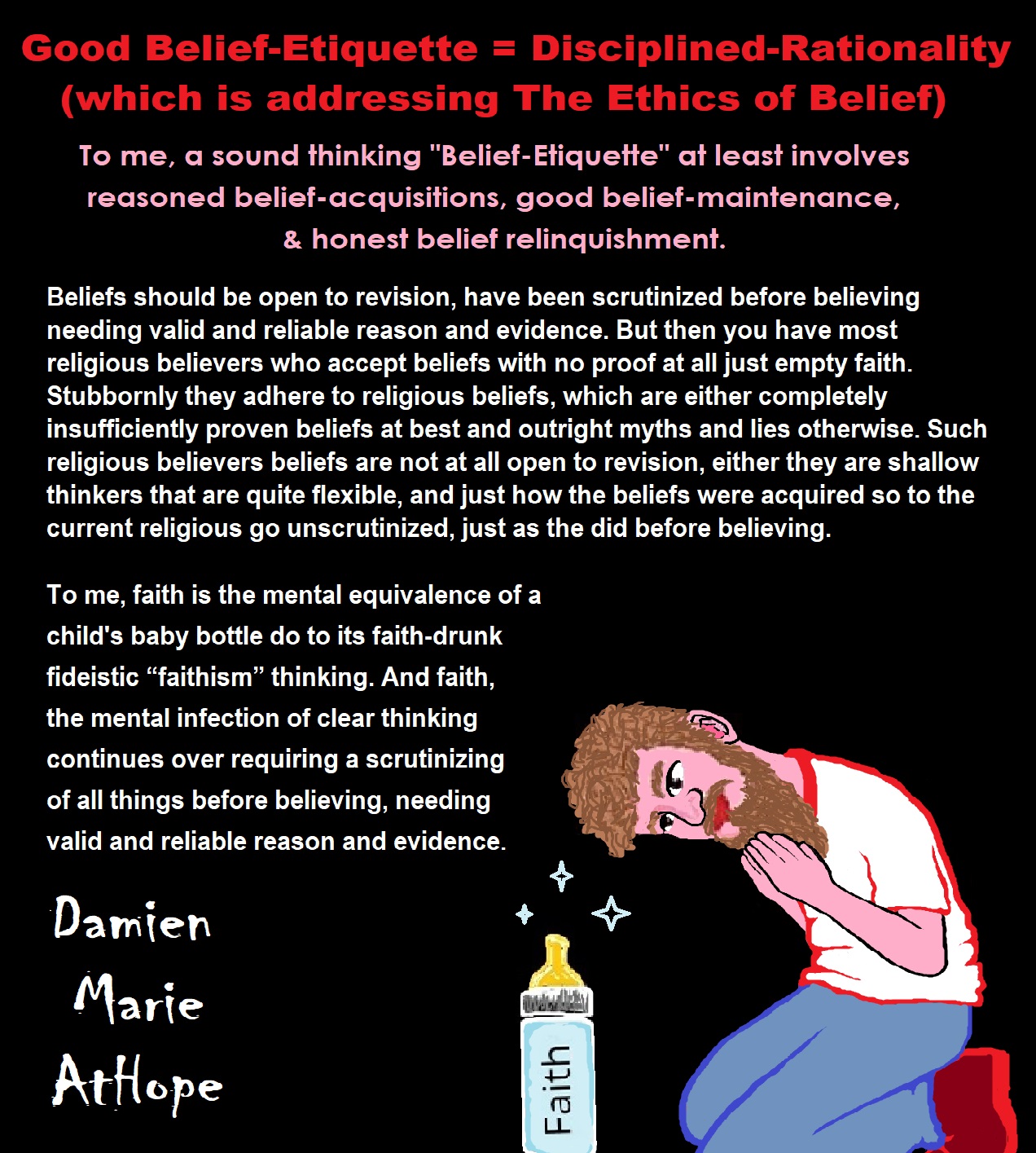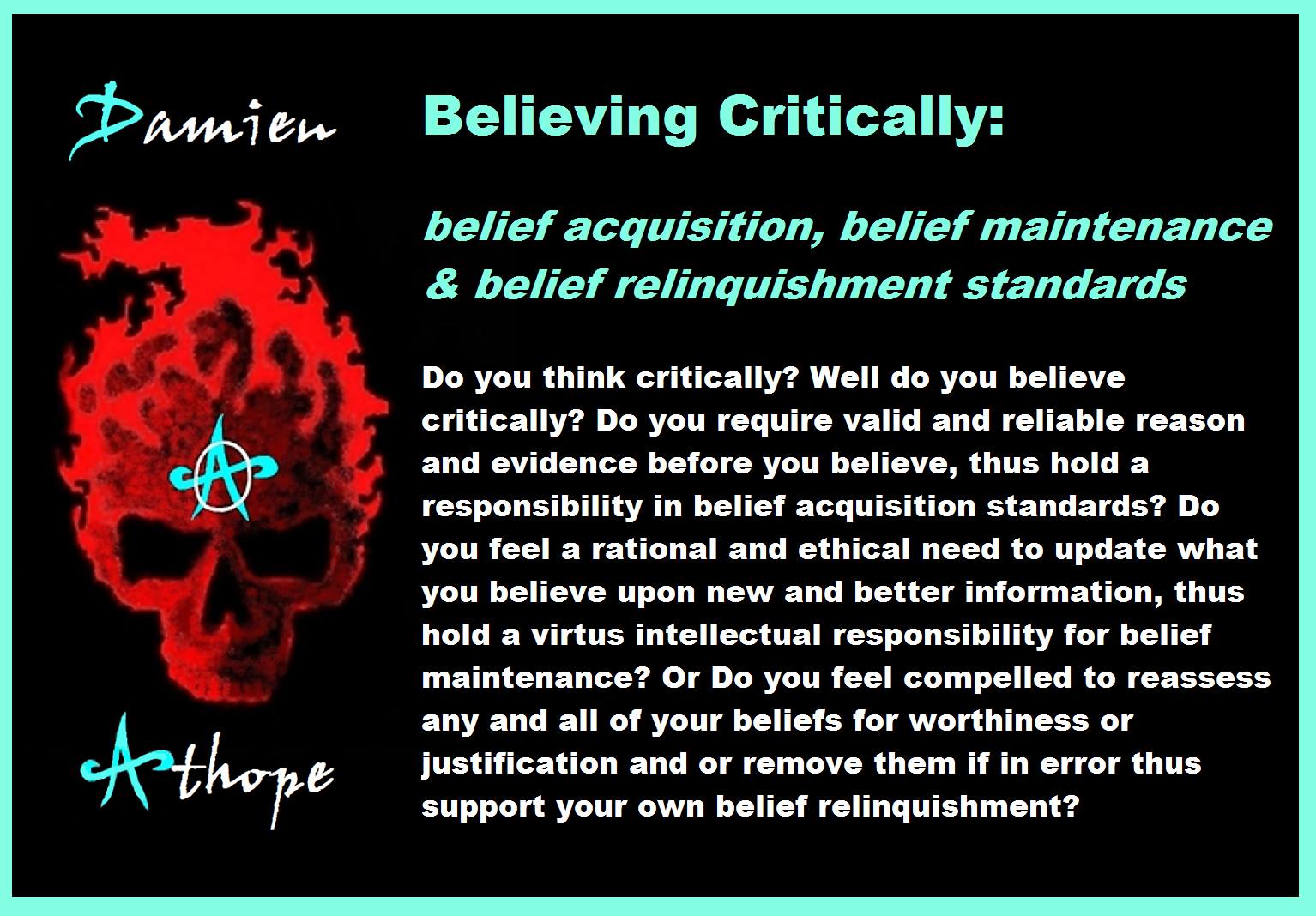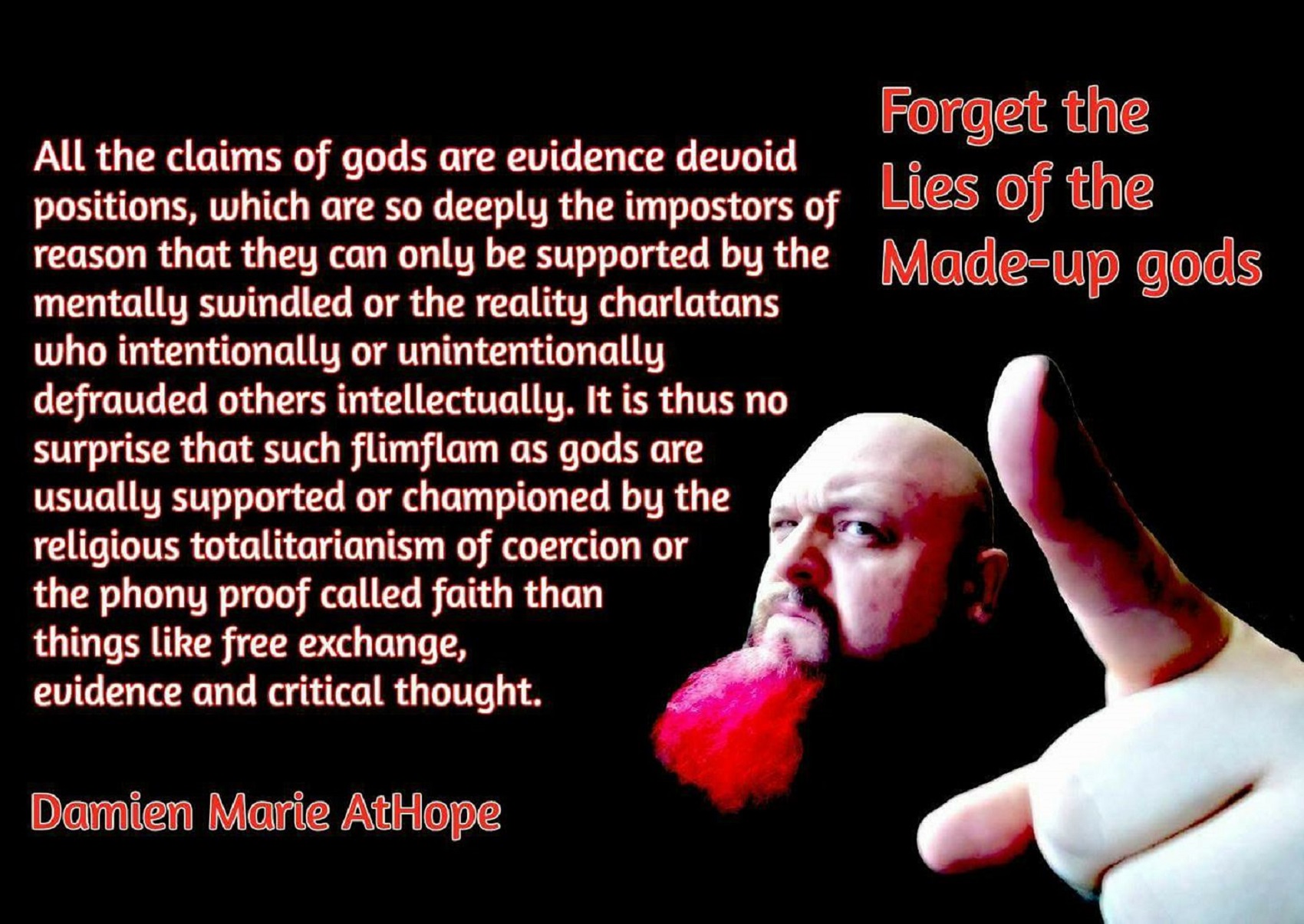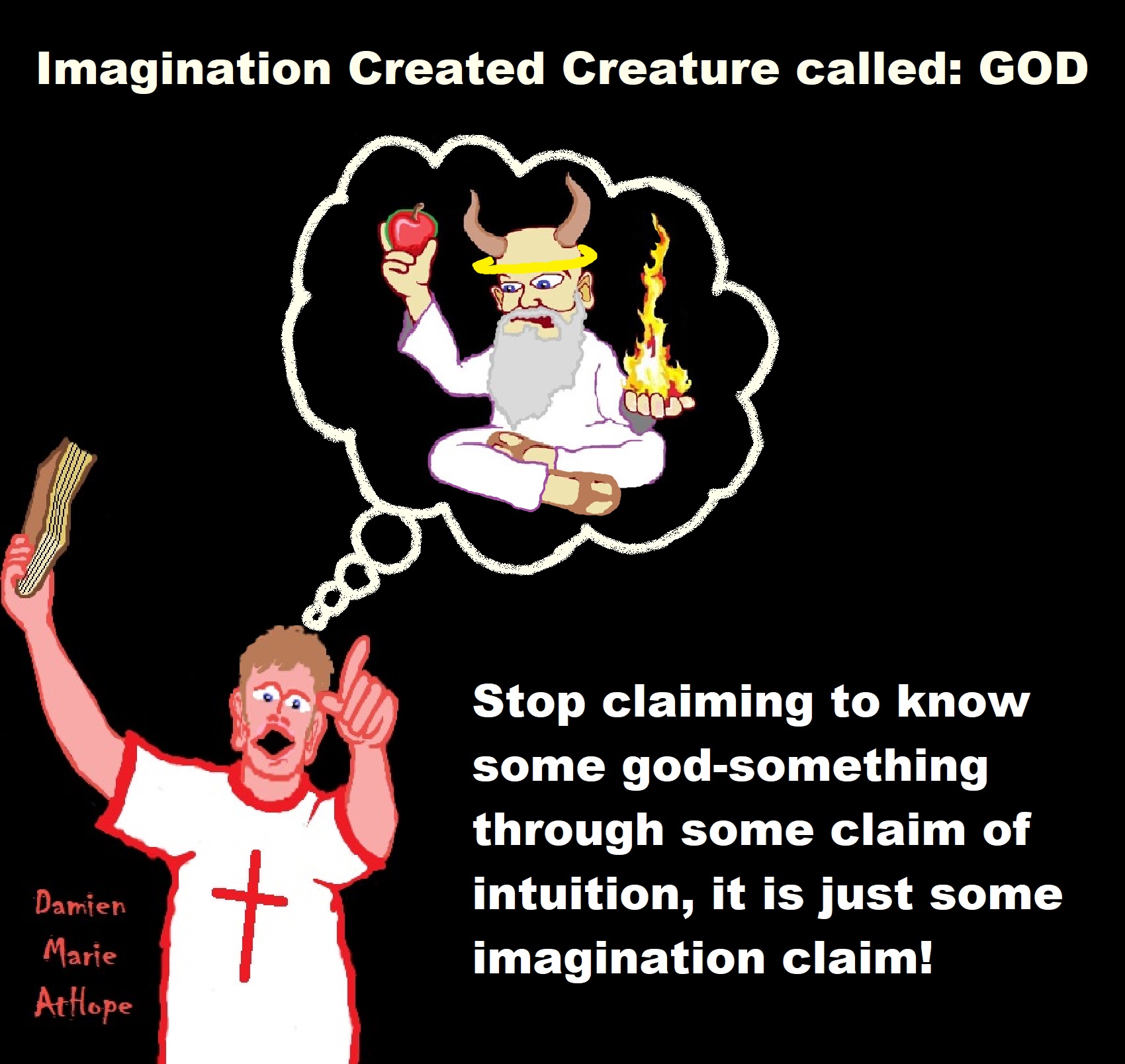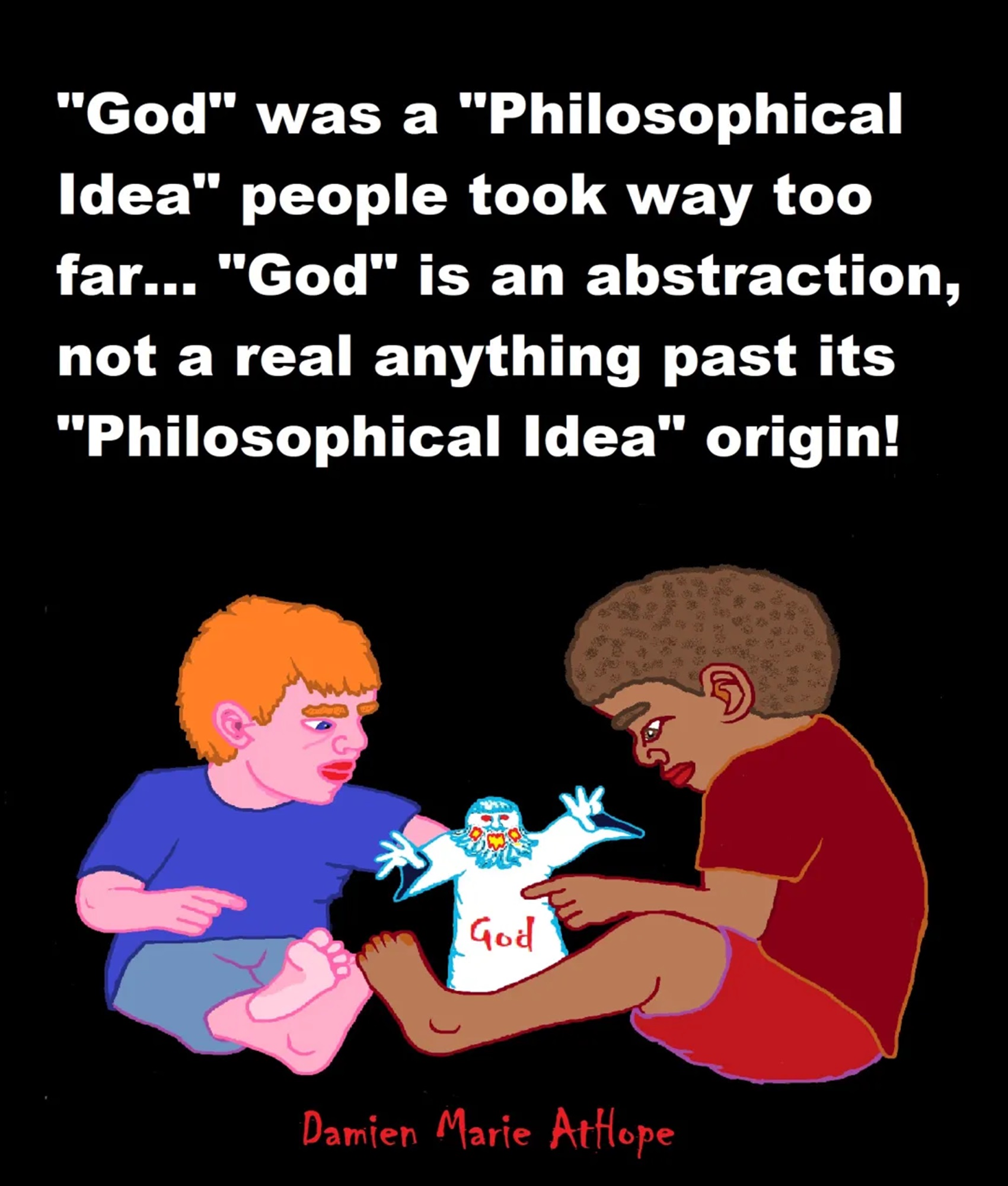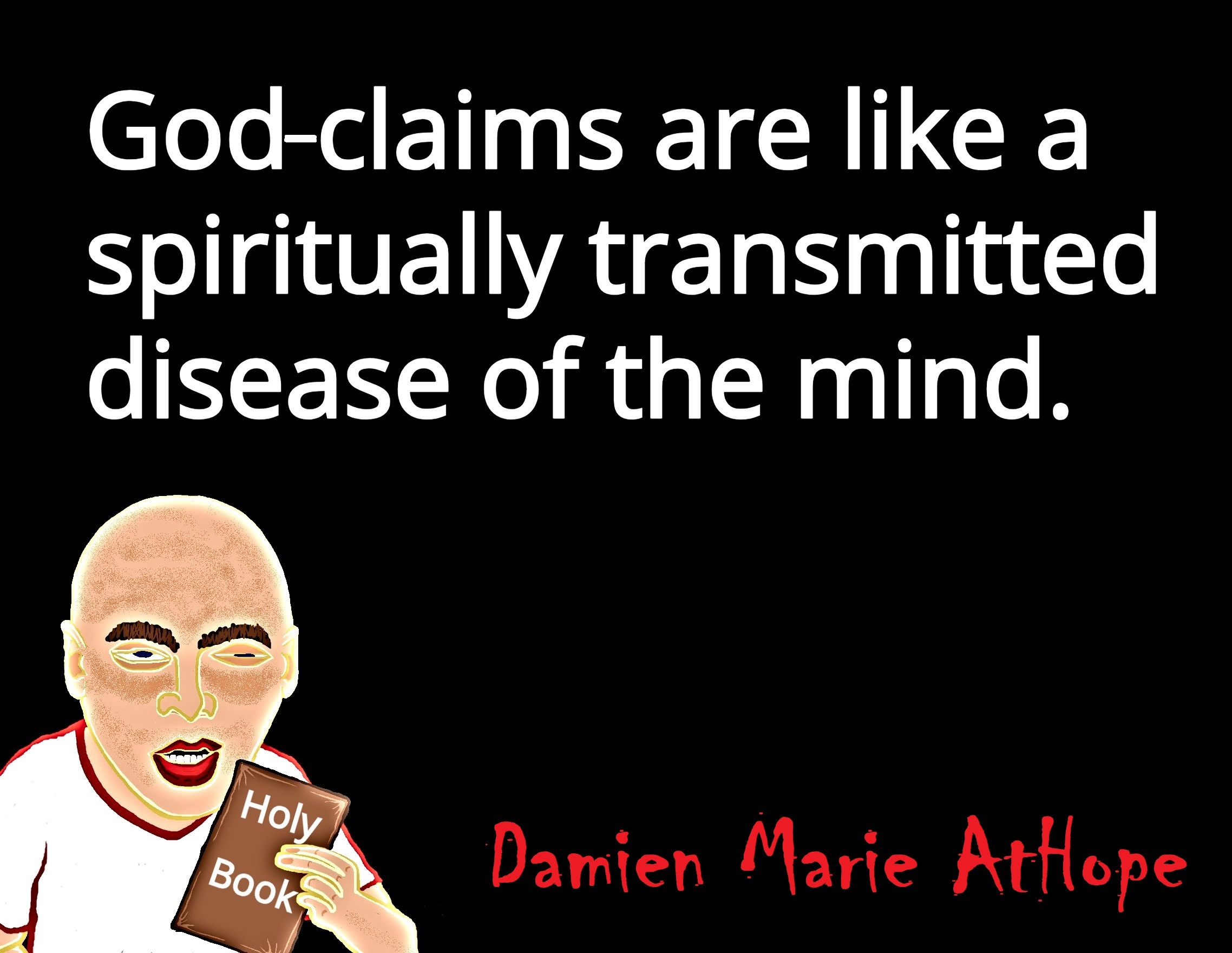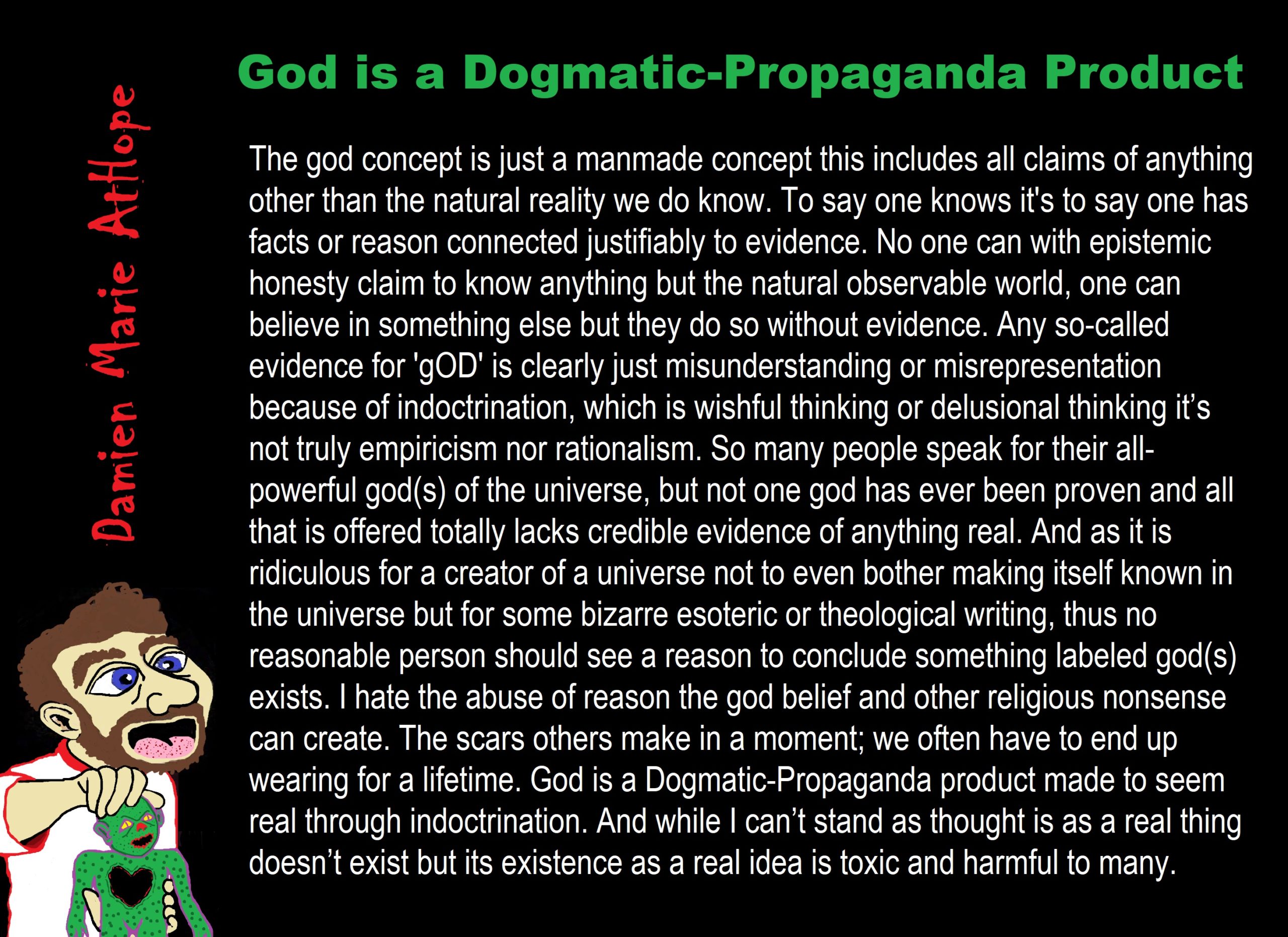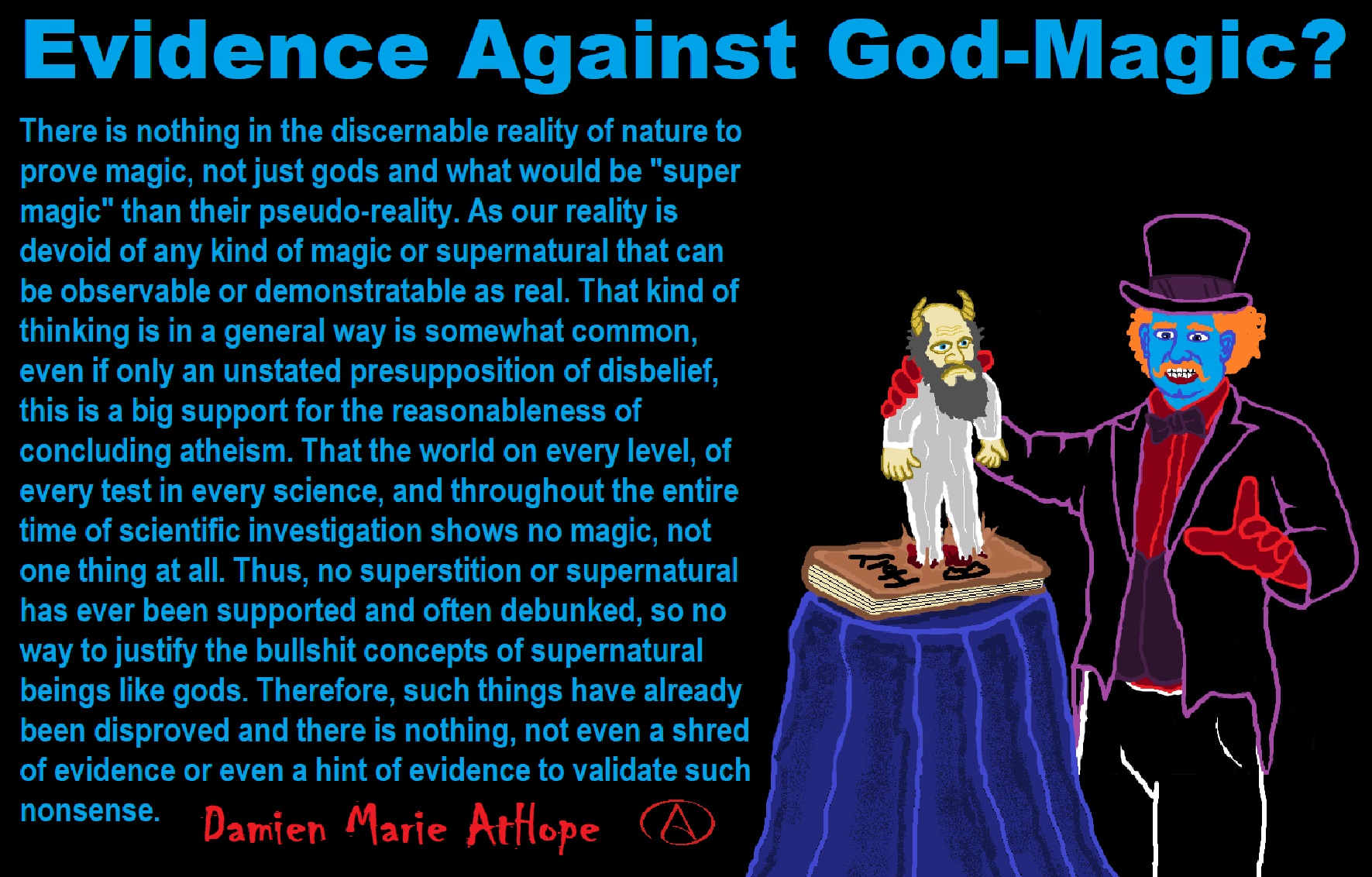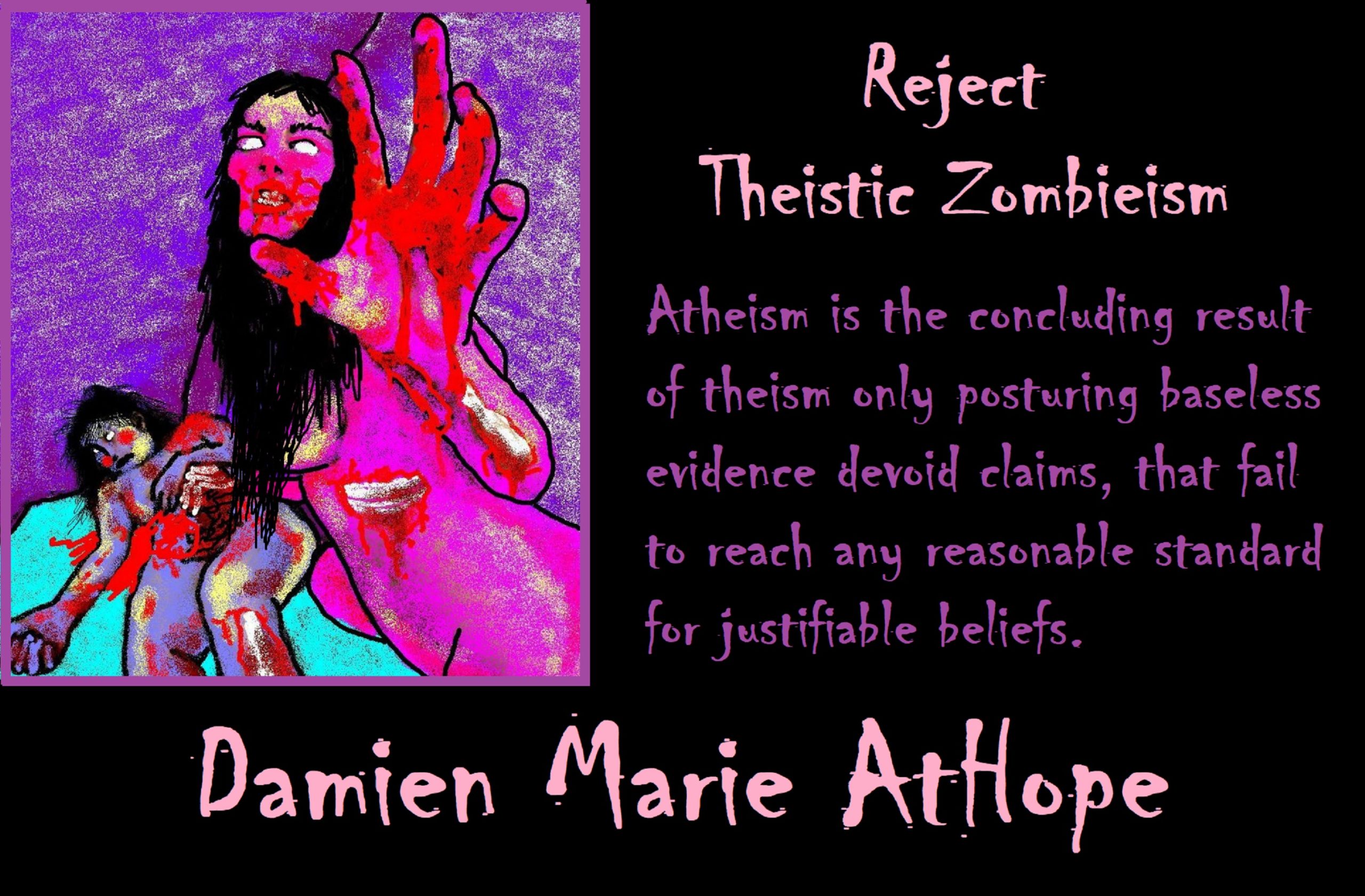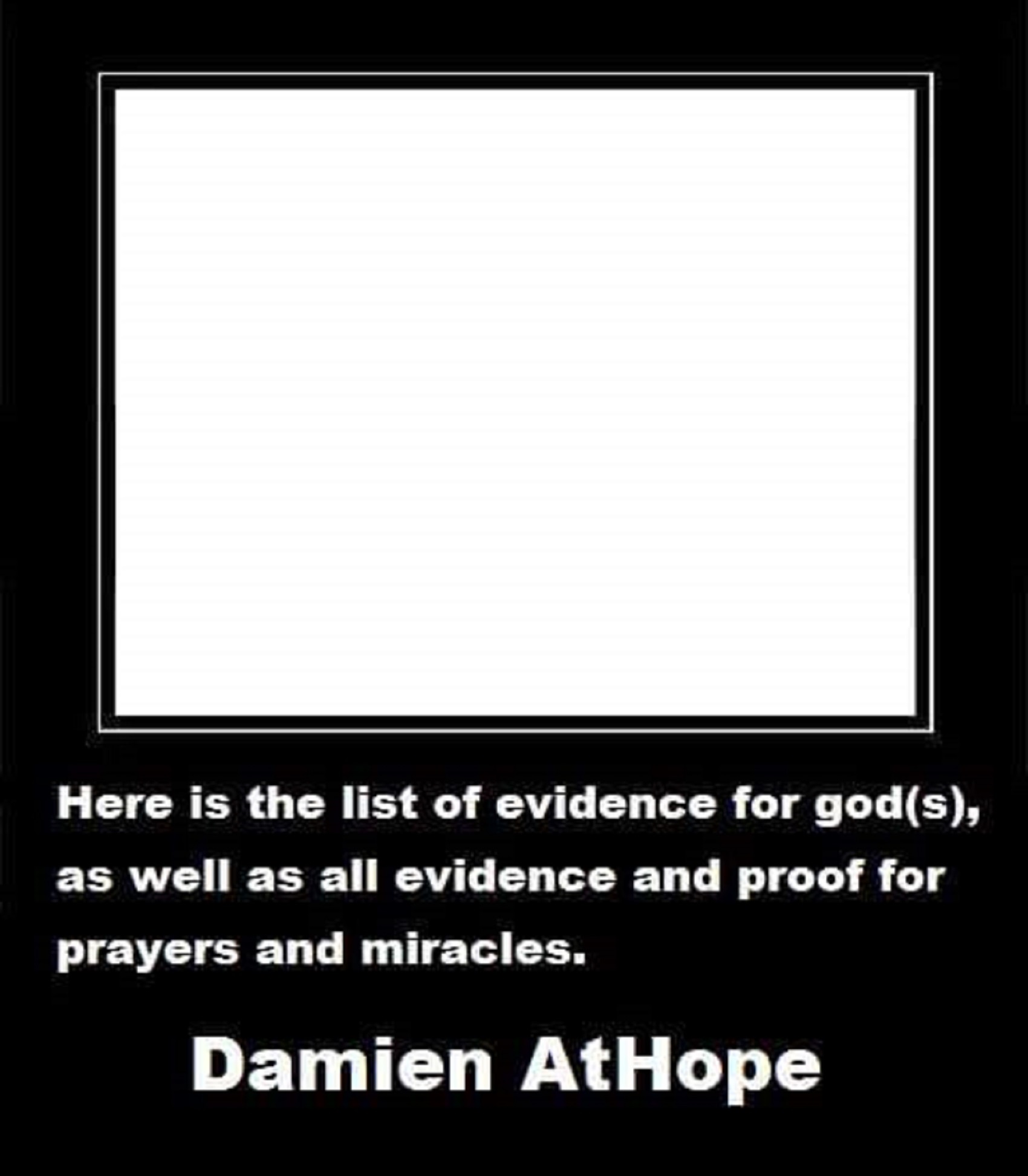

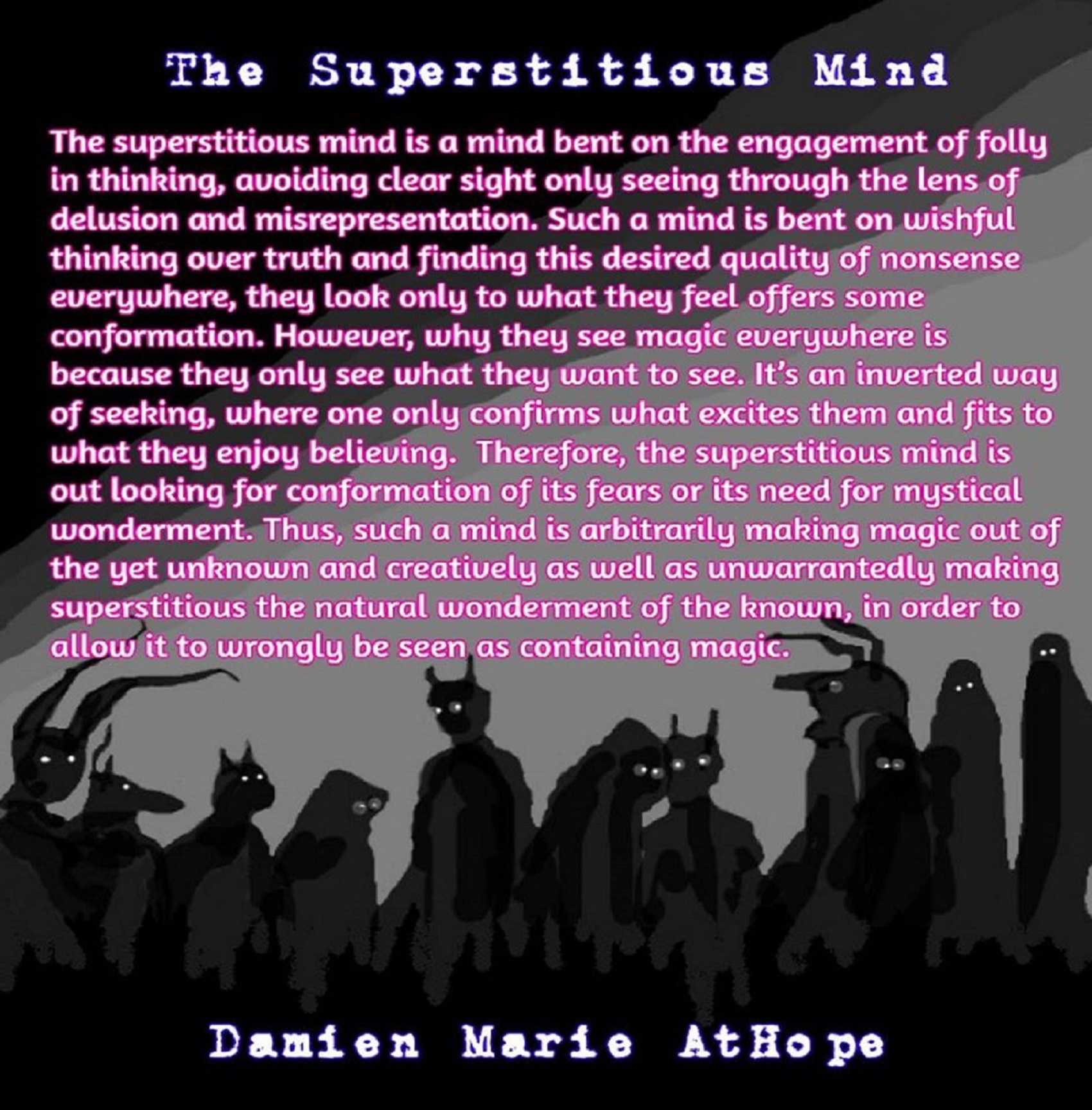
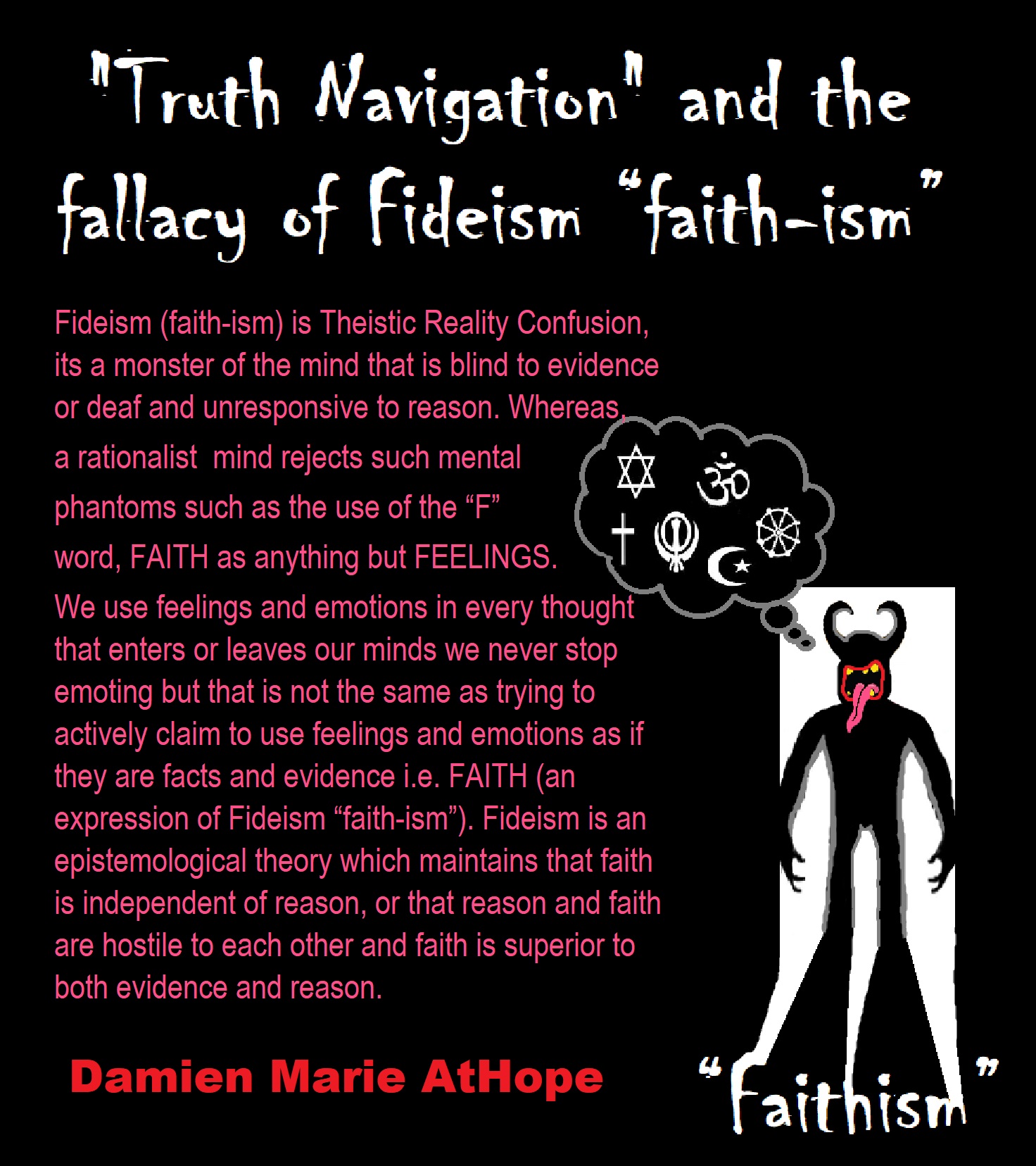
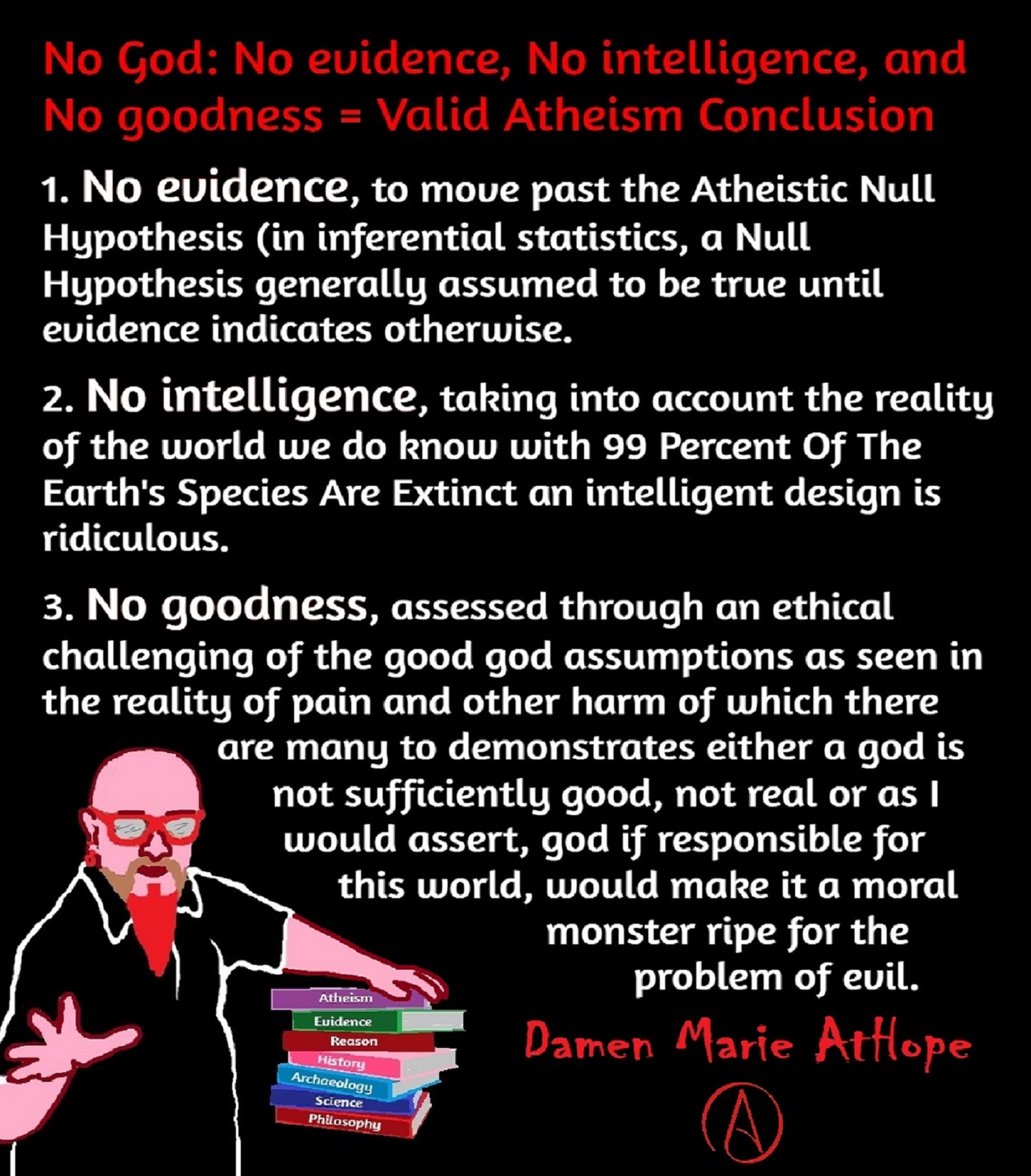

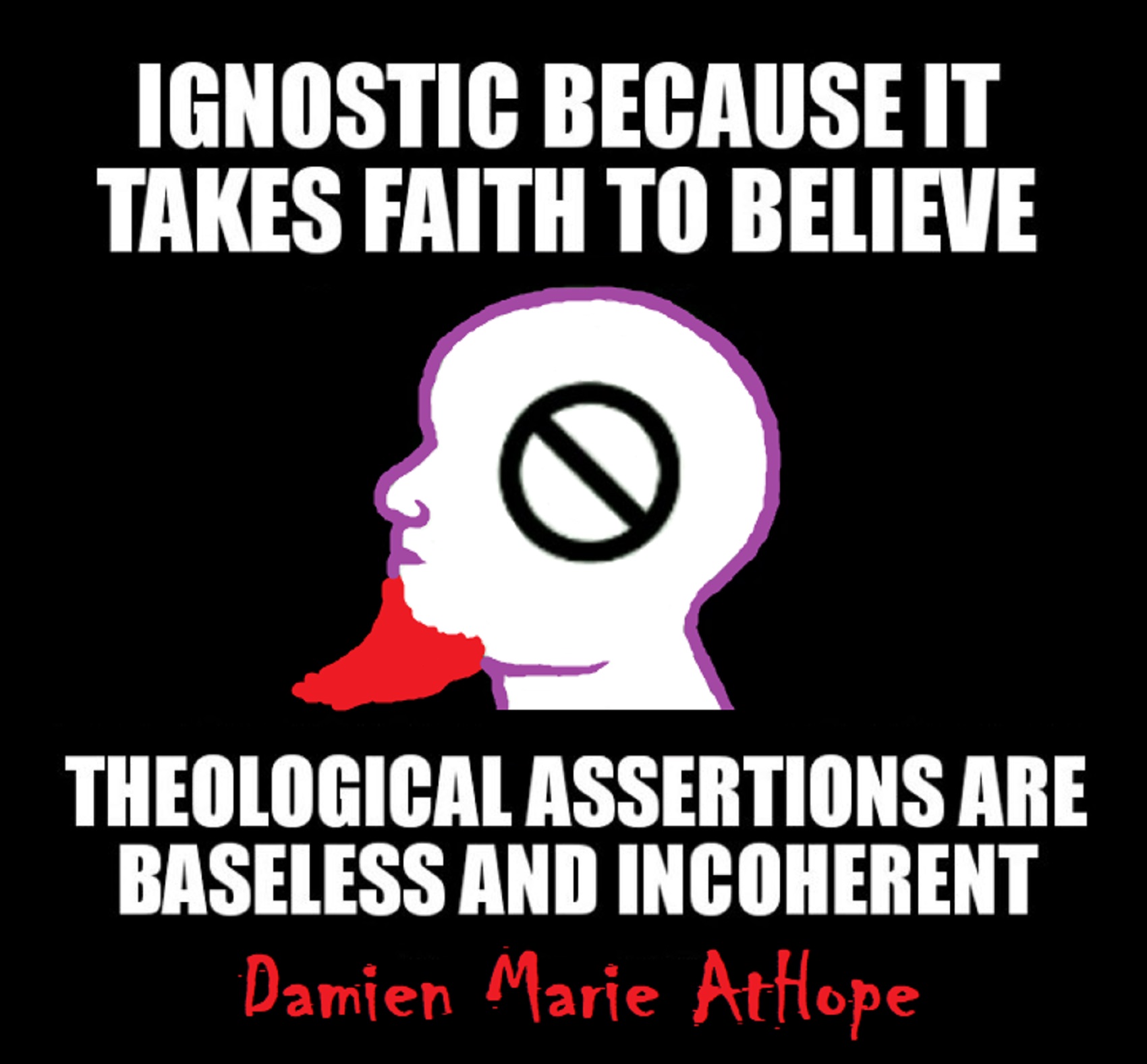
Contradictions and god cannot logically co-exist.
What is a god?
If you think you believe in a god, “what do you mean by god,” saying a name tells me not one thing about the thing I am asking to know “its” beingness/thingness/attributes/qualities. Thus, what is the thing “god” to which you are talking about and I want you to explain its beingness/thingness/attributes/qualities? Religious/theistic people with supernatural beliefs often seem as though they haven’t thought much about and that is something we can help using ontology questions about the beingness/thingness/attributes/qualities they are trying to refer too. What do you mean by god, when you use the term god? And, I am not asking you for the name you attach to the thing you label as a god. I don’t need to know what the god you believe is known “by.” I am asking, what is the thing you are naming as a god and what that thing is, its qualities in every detail like all things have if they are real. Are you just making stuff up or guessing/hoping or just promoting unjustified ideas you want to believe, what is a god?
Do you want what is true or want what you believe without concern for what may actually be true?
Childhood Indoctrination is often the gateway drug,
to a life of irrational magical thinking superstitions, like ghosts, gods, or guardian spirits.
It seems, in general, the less education and higher poverty have a higher correlation to being religious.
Disproof by logical contradiction
‘A Logical Impossibility’
No God: No evidence, No intelligence, and No goodness = Valid Atheism Conclusion
- No evidence, to move past the Atheistic Null Hypothesis: There is no God/Gods (in inferential statistics, a Null Hypothesis generally assumed to be true until evidence indicates otherwise. Thus, a Null Hypothesis is a statistical hypothesis that there is no significant difference reached between the claim and the non-claim, as it is relatively provable/demonstratable in reality some way. “The god question” Null Hypothesis is set at as always at the negative standard: Thus, holding that there is no God/Gods, and as god faith is an assumption of the non-evidentiary wishful thinking non-reality of “mystery thing” found in all god talk, until it is demonstratable otherwise to change. Alternative hypothesis: There is a God (offered with no proof: what is a god and how can anyone say they know), therefore, results: Insufficient evidence to overturn the null hypothesis of no God/Gods.
- No intelligence, taking into account the reality of the world we do know with 99 Percent Of The Earth’s Species Are Extinct an intelligent design is ridiculous. Five Mass Extinctions Wiped out 99 Percent of Species that have ever existed on earth. Therefore like a child’s report card having an f they need to retake the class thus, profoundly unintelligent design.
- No goodness, assessed through ethically challenging the good god assumptions as seen in the reality of pain and other harm of which there are many to demonstrates either a god is not sufficiently good, not real or as I would assert, god if responsible for this world, would make it a moral monster ripe for the problem of evil and suffering (Argument from Evil). God would be responsible for all pain as life could easily be less painful and yet there is mass suffering. In fact, to me, every child born with diseases from birth scream out against a caring or loving god with the power to do otherwise. It could be different as there is Congenital insensitivity to pain (CIP), also known as congenital analgesia, in which a person cannot feel (and has never felt) physical pain.[1]
- My life; the good, the bad, and the ugly on the road to the Mental Freedom of Atheism
- I Believe Archaeology, not Myths & Why Not, as the Religious Myths Already Violate Reason!
- Archaeological, Scientific, & Philosophic evidence shows the god myth is man-made nonsense.
- Truth is a Value (axiological) Judgment.
- Axiological Atheism not Nihilist Atheism
- Interview of Formal Axiological Atheist Dr. William Kelleher
- I am an Axiological Atheist, with a Rationalist Persuasion, who Supports Anarcho-Humanism
- Axiological Atheism is Intellectualism
- “Value Theory/Value Science” atheism: AXIOLOGICAL ATHEISM
- Explaining Axiological theism, Axiological agnosticism, and Axiological atheism
- Axiological Atheism Supports Humanism & Secularism
- Axiological Atheism Morality Critique: of the bible god
- As an Axiological Atheist, I wish for Human Flourishing
- Psychological certainty and Epistemic certainty?
- Losing My Religion and MY Faith Addiction
- Ignostic Atheist: Do you Have a Coherent Definition of god?
- god Claims are a Non-Reality Commodity
- My Blogs on the Evolution of RELIGION
- Explaining My thoughts on the Evolution of Religion
- My Blogs Somewhat Relating to Science
- I am against Hereditary religion?
Theism is presented as adding love to your life… But to me, more often it peddles in ignorance (pseudo-science, pseudo-history, and pseudo-morality), tribalism (strong in-group loyalty if you believe like them and aversion to difference; like shunning: social rejection, emotional distance, or ostracism), and psychological terrorism; primarily targeting well being both safety and comfort (you are born a sinner, you are evil by nature, you are guilty of thought crimes, threats of misfortune, suffering, and torture “hell”).
Hell yes, I am against the fraud that is the world religions.
Why not be against the promotion of woo-woo pseudo-truth, when I am very against all pseudo-science, pseudo-history, and pseudo-morality and the harm they can produce. Along with the hate, such as sexism and homophobia are too often seen or the forced indoctrination of children. And this coercive indoctrination of the world religions, with their pseudo-science, pseudo-history, and pseudo-morality mainly furthered by forced Hereditary Religion (family or cultural, religious beliefs forced on children because the parent or caregiver believes that way). This is sadly done, even before a child can be expected to successfully navigate reason; it’s almost as if religious parents believe their “woo-woo pseudo-truth” lies will not be so easily accepted if they wait on a mind that can make its own choice. Because we do see how hard it is for the ones forced into Hereditary Religion. It seems difficult for them to successfully navigate reason in relation to their woo-woo pseudo-truth, found in a religion they were indoctrinationally taught to prefer, because after being instructed on how to discern pseudo-truth as truth than just wishing that their blind servitude belief in a brand of religious pseudo-truth devoid of justified, valid or reliable reason and evidence. I care because I am a rationalist, as well as an atheist.
Thus, this religious set of “woo-woo pseudo-truth” pushed on the simple-minded as truth bothers me greatly. So, here it is as simple as I can make it you first need a good thinking standard to address beliefs one may approach as a possible belief warranted to be believed. I wish to smash that lying pig of religion with the Hammer of Truth: Ontology, Epistemology, and Axiology Questions (a methodological use of philosophy). Overall, I wish to promote in my self and for others; to value a worthy belief etiquette, one that desires a sound accuracy and correspondence to the truth: Reasoned belief acquisitions, good belief maintenance, and honest belief relinquishment. May we all be authenticly truthful rationalists that put facts over faith.
I have made many mistakes in my life but the most common one of all is my being resistant to change. However, now I wish to be more, to be better, as I desire my openness to change if needed, not letting uncomfortable change hold me back. May I be a rationalist, holding fast to a valued belief etiquette: demanding reasoned belief acquisitions, good belief maintenance, and honest belief relinquishment.
Axiological “Presumptive-Value”
Axiological “presumptive-value” success: Sound Thinker: uses disciplined rationality (sound axiological judgment the evaluation of evidence to make a decision) supporting a valid and reliable justification.
Axiological “presumptive-value” failure: Shallow Thinker: undisciplined, situational, sporadic, or limited thinking lacking a valid and reliable justification.
“Presumptions are things that are credited as being true until evidence of their falsity is presented. Presumptions have many forms and value (Axiology) is just one. In ethics, value denotes the degree of importance of something or action, with the aim of determining what actions are best to do or what way is best to live (normative ethics), or to describe the significance of different actions. It may be described as treating actions as abstract objects, putting VALUE to them. It deals with right conduct and living a good life, in the sense that a highly, or at least relatively high valuable action may be regarded as ethically “good” (adjective sense), and that an action of low value, or relatively low in value, may be regarded as “bad”. What makes an action valuable may, in turn, depend on the ethic values of the objects it increases, decreases or alters. An object with “ethic value” may be termed an “ethic or philosophic good” (noun sense). Values can be defined as broad preferences concerning appropriate courses of actions or outcomes. As such, values reflect a person’s sense of right and wrong or what “ought” to be. “Equal rights for all”, “Excellence deserves admiration”, and “People should be treated with respect and dignity” are representatives of values. Values tend to influence attitudes and behavior and these types include ethical/moral values, doctrinal/ideological(religious, political) values, social values, and aesthetic values. It is debated whether some values that are not clearly physiologically determined, such as altruism, are intrinsic, and whether some, such as acquisitiveness, should be classified as vices or virtues.” ref, ref
“Sound thinking to me, in a general way, is thinking, reasoning, or belief that tends to make foresight a desire to be as accurate as one can with valid and reliable reason and evidence.”
Sound axiological judgment, to me, a “presumptive-value” success, is value judged opinions expressed as facts with a valid and reliable justification. In an informal and psychological sense, it is used in reference to the quality of cognitive faculties and adjudicational (relating to adjudication) capabilities of particular individuals, typically called wisdom or discernment. In a legal sense, – used in the context of a legal trial, to refer to a final finding, statement, or ruling, based on a considered weighing of evidence, called, “adjudication“.
Sound Thinkers don’t value FAITH
For example, deities exhibits natural characteristics, the wind as science knows is a purposeless natural force, whereas gods are often attributed as being the force of purpose in wind such as seen in in the phrases, bhagavad-gita 10.21 commentary by Sri Sridhara Swami “Krishna is a lead wind”, bible: Exodus 10:13, “god brought wind”, and quran: Surat Al-Jāthiyah 45:5-6 mentions, “allah changing winds.”
Likewise, deities exhibits human characteristics such as seen in in the phrase, “Krishna is jealous” Holi festival Hinduism, “god is jealous” Exodus 20:5, and “allah is jealous” Jami` at-Tirmidhi – Book 12, Hadith 1201.
This fact of an undeniable anthropomorphic connection found in all creator deities, even in their most ethereal forms, can be easily addressed. For instance, if you say the “unknown/unknowable” origins of the universe involves an “it,” something with a beingness and humanness, can, in some form, then reasonably be seen as denoting some amount of anthropomorphism.
The problem with this beingness god concept is with anthropomorphic reasoning that entails humans’ styled thinking, behavior, and beingness, which evokes a limited realm of personality, which is fixed in time, space, and place.
So it can be assume from these references as well as many more that a reasonable conception of “deities” are ultimately an indirect beingness reference to anthropomorphism and an argument from analogy.
Argument from analogy involves perceived similarities; such as an all-powerful designer being, a power attributed as infinite thing with somethingness as well as to unlimited possibilities (wind: nonbeingness; and thing with human characteristics: beingness).
However, if this designer of the universe is an ultimately all-powerful and infinite thing, it is being attributed to unlimited possibilities, which creates an unlimited all-powerful paradox of possibilities.
Could such an infinite creator being or somethingism force be able to destroy itself or create an even more powerful being?
If the deity or force is ultimately all-powerful, it can destroy itself or create an even more powerful being than its own existence, but an infinite being cannot be eliminated nor be limited by having a greater being than itself by definition, which creates a contradiction and cannot logically exist.
Once contradicting reason or evidence is available, the conclusions should be rejected whether a god hypothesis or otherwise. In this case, counter-evidence of the inference to anthropomorphic leads us to a design or designer with beingness and nonbeingness, thus not logical, as it is natural and supernatural. The god, like us with beingness and simultaneously not like us, lacking beingness is a logical paradox contradiction. The best-invented god concept is the one with the greatest attributes or most clearly defined characteristics but, in so doing, it is the invented god concept containing the highest level of logical contradictions, meaning it cannot logically exist.
I am an Out Atheist, Antitheist, and Antireligionist as a Valuized Ethical Duty.
How can we silently watch as yet another generation is indoctrinated with religious faith, fear, and foolishness? Religion and it’s god myths are like a spiritually transmitted disease of the mind. This infection even once cured holds mental disruption which can linger on for a lifetime. What proof is “faith,” of anything religion claims by faith, as many people have different faith even in the same religion? When you start thinking your “out, atheism, antitheism or antireligionism is not vitally needed just remember all the millions of children being indoctrinated and need our help badly and who desperately need our help with the truth. Three things are common in all religions: “pseudo-science,” “pseudo-history,” and “pseudo-morality.” And my biggest thing of all is the widespread forced indoctrination of children, violating their free choice of what to not believe or believe, I hate forced hereditary religion.
I love attacking people on the grounds of ontology like my battering ram,
I am here to force you to think and remove thinking errors.
Ontology (Greek meaning ontos, “being; that which is”; and logos meaning “discourse, study, ratio, calculation, reason”) Ontology is the philosophical study of the nature of being, becoming, existence, or reality, as well as the basic categories of being and their relations.
*Ontology (thingness of things) questions to define or compare and contrast thingness.
- Ontology “Reality” questions/assertion: Witness gives evidence about the claim.
- *Ontology, (understanding the thingness of things; like what is or can be real, like not god)-What is your claim?-What aspects must be there for your claim?-What makes your claim different than other similar claims?
Take for instance how Religion supporters try the evaluation tactic of saying “there are peaceful Religions.”
I may respond, what do you mean by Religion and what do you mean by painful or good” (asking to find the truth or as usual expose the lack of a good Ontology)
Then, I may respond, “how do you know that, what is your sources and how reliable they are” (asking to find the truth or as usual expose the lack of a good Epistemology)
Then, I may respond, “what value do you think what you are saying has and to what level of proof do you feel truth needs as well as how do you insure Accuracy” (asking to find the truth or as usual expose the lack of a good Axiology)
Ontological atheism: ontological atheism asserts Ontological theism arguments aim too high. Just like logical calculus cannot ascertain a specific basic proposition is correct, existential calculus should not be able to conclude that some specific being exists. Logical calculus can show that if a bachelor exists then a man exists (since a bachelor is, specifically, a man), and existential calculus might be able to show that if certain things exist then a god something exists. But ontological arguments try to prove that something (god) exists without committing to the existence of any specific thing. They can therefore be roughly divided into several types:- (a) ones that assume that a god something exists from the get-go, but disguise it in some way; (b) ones that make an error in existential calculus, so are not sound; (c) ones that are correct but trivial, e.g. showing that the sum of all things exists in some sense. rethinks if one agrees that the existence of a god something has indeed been proven, you still really don’t know much about that god other than that it is infinite and perfect. These characteristics seem to be quite dangerous in light of the characteristics of a god something that have been posited by many organized religions. They posit someone who cares for us and who would simultaneously damn us to eternity in hell for our failure to believe in him thus we cannot and should not believe in a god something. Using rationality, one cannot conceive of a god something with infinite perfection, with anthropomorphic qualities (i.e. human motivation, characteristics, or behavior) or an infinite god holding judgments or care about what humans do. Ontological atheism reveals that the Ontological theism argument is problematic on four grounds: A) It defines a god something as a Necessary being which is necessarily O, and then “derives” that god is a necessary being. This isn’t so much a flaw as it is misleading. B) It assumes that which it seeks to prove, namely it assumes that the Necessary-god-Something is logically possible, which denies the very possibility that god doesn’t exist. Instead of wrestling with the claim that god doesn’t exist and showing it is false, the argument a-priori assumes that it is false. C) It relies on a confusion between epistemic and logical possibility. As a broad proposition the Necessary-god-Something needs to be treated as an epistemic possibility, leading to a weakened 1B which cannot support the rest of the argument. D) Even the weakened 1B should not be accepted. Like all Necessary postulates, that a Necessary-god-Something exists is either true in all possible worlds or not true in all possible worlds. The argument doesn’t advance the position that it is true in all possible worlds. Ontology (Greek meaning ontos, “being; that which is”; and logos meaning “discourse, study, ratio, calculation, reason”). Ontology is the philosophical study of the nature of being, becoming, existence, or reality, as well as the basic categories of being and their relations. *Ontology (thingness of things) questions to define or compare and contrast thingness.* Ontology “Reality” questions/assertion: Witness gives evidence about the claim. Ontology, (understanding the thingness of things; like what is or can be real, like not god). -What is your claim? -What aspects must be there for your claim? -What makes your claim different than other similar claims? Take for instance how Religion supporters try the evaluation tactic of saying “there are peaceful Religions.” I may respond, what do you mean by Religion and what do you mean by painful or good” (asking to find the truth or as usual expose the lack of a good Ontology). To me belief ontologies address the conceptual schemas involved, at the intersection of three elements: A belief is a placeholder for a mental agreement to a offered idea, behavior or thing. We dont know what us being accurately believed and this mans all beliefs are open to challenge or they should be. Many people either have no standard to how they test or process their thinking and thus have untrustworthy and such a lack of a developed thought structure employ thinking systems with a high susceptibility to flaws, And this is where we use ontological challenging or ontological disproofs which are logical arguments posed against arguments made by an attacker/challenger to hone in and access the thinking of believing flaws, and the attacker capability to exploit a flaw. Ontological disproofs, are sophisticated ontological arguments, ontological challenges or ontological disproofs accusations that demand equally sophisticated responses, to which, many people are unprepared. Belief or argument forms should be valid, to prove them sound or unsound, strong/weak, or well defined/undefined, as weak premises must be shown to be false. By use ontological challenging, you are shining a light on its ways claimed or points proposed, outlined or arranged which equals a thing or its qualities to define it that makes the depth and fullness to a being or thing, like just what is provisional about the thing in question or offer, are the characteristics of adequate development structure and infrastructure of the ontology involved in claims or propositions as truth, fact, or knowledge? One ontological criticism focuses on the semantics that are given for quantifiers qualities used or involved as the notation of the language representations of the contents of belief talk, proposing that the qualities offered are fully alike (unequivocal) when the items or properties identified to you are likely one of the three partly unlike (equivocal). To me, ontologies are like an adequate way or web of elements involved in the thingness of things or ideas. Point by slow methodological point, is the most effective way to use ontological challenging. Ontologically challenge needs to be done, in order to develop in the other person, an ontological insecurity about what the person, place, thing, or idea are construction of and just what is being claimed, portrayed or proposed as truth, fact, or knowledge? A belief or set of beliefs, likely have a relationship between ideas of the thing expose the cracks and fissure in the conceptualizations divided up or overlap but often while a belief or set of beliefs are offered with assurance, they instead ontologically inadequate or almost completely ontologically empty. By exposing ontological vulnerabilities or weakness in a belief or set of beliefs can rise person’s sense of ontological Insecurity as the thinker realized they may not know that that know. In my way of thinking as ontological insecurity refers or relates to in an existential sense a person’s sense of “belief” deflation, discrediting, or disproving. Such an ontologically insecure thinker, may be so ontologically desperate, to stop/lower believing/accepting the level of “reality or existence” of the things or ideas they were just referring to. In contrast, the ontologically secure thinker, may be so ontologically stable in relation to ontological commitment of their fragments involved to feel a high level. Ontological arguments or Ontological commitment need to demonstrate or require demonstration of the disciplined or disordered structures but, a priori and necessary premises to the conclusion. 1, 2
Rationalist atheism: Almost all rationalists are atheists or agnostics. There has been a long link between rationalism and scientific method. There is also a long tradition of philosophers who have approached philosophical and ethical questions from a rationalist perspective. Bertrand Russell’s “The Faith of a Rationalist” is an example of a rationalist approach to religious belief. Rationalism is an approach to life based on reason and evidence. Rationalism encourages ethical and philosophical ideas that can be tested by experience and rejects authority that cannot be proved by experience. Because rationalism encourages people to think for themselves, rationalists have many different and diverse ideas and continue in a tradition from the nineteenth century known as freethought. However, most rationalists would agree. There is no evidence for any arbitrary supernatural authority e.g. God or Gods. The best explanation so far for why the natural world looks the way it does is the theory of evolution first put forward by Charles Darwin. All human beings should have fundamental rights. Some rationalists and humanists go further and argue that animals should also have rights as they are living, sensate beings. Society is should be an “open society”, where each individual is able to live “freely and equally practice their chosen life stance, and in which human potential is realized to the benefit of the individual and the community at large.” (Levi Fragell, President of International Humanist and Ethical Union, 2001) As well as approaching life through reason, rationalists enjoy those things in life where emotion and imagination are to the fore. Rationalist atheists wish to follow and inspire in others a desire or value in or for epistemology, axiology, and rationality. Rationalist atheists want to strive for a corresponding and coherent value assessment along with an epistemological rationally, rational epistemology, as well as an accurate or at least a methodological rationally connecting to a epistemic value of the epistemology state of things or ideas. Rationalist atheists want to know what is it to be Rational? To be “rational” is generally considered to mean employing logical consistency and deriving appropriate conclusions from acceptable assumptions. Epistemic value is a kind of value which attaches to cognitive successes such as true beliefs, justified beliefs, knowledge, and understanding. These kinds of cognitive success do of course often have practical value. True beliefs about local geography help us get to work on time; knowledge of mechanics allows us to build vehicles; understanding of general annual weather patterns helps us to plant our fields at the right time of year to ensure a good harvest. By contrast, false beliefs about the existence of weapons of mass destruction can lead nations to fight hugely expensive wars that are ultimately both destructive and useless. It is fairly uncontroversial that we tend to care about having various cognitive or epistemic goods, at least for their practical value, and perhaps also for their own sakes as cognitive successes. There is not just one type of rationalism or use of rationally. Epistemic rationality: believing, and updating on evidence, so as to systematically improve the correspondence between your map and the territory. The art of obtaining beliefs that correspond to reality as closely as possible. This correspondence is commonly termed “truth” or “accuracy”, and we’re happy to call it that. Instrumental rationality: achieving your values. Not necessarily “your values” in the sense of being selfish values or unshared values: “your values” means anything you care about. The art of choosing actions that steer the future toward outcomes ranked higher in your preferences. On LW we sometimes refer to this as “winning”. 1 2 3
Ontology, Epistemology, & Axiology Damien’s argument/challenge protocol: “The Hammer of Truth” is the use of Ontology, Epistemology and Axiology questions to remove errors and add accuracy. It is also my folk name for Scientific Philosophy: Ontology, Epistemology, and Axiology”
Ontology, Epistemology, & Axiology OEA (The Hammer of Truth)
OEA “Hammer of Truth” Questions:
Ontology, Epistemology, & Axiology questioning tools in inquiry, disagreements, arguments, or debates.
*Ontology (thingness of things) questions to define or compare and contrast thingness.
*Epistemology (knowledge of things) questions to explode or establish and confirm knowledge.
*Axiology (value/worth/goodness of things) questions to valueize (value judge) or establish and confirm value or disvalue, worth or dis-worth, as well as goodness or un-good.
(OEA challenge protocol; is part of my, Methodological Rationalism approach)
Expressed in its simplest form, The Hammer of Truth: Ontology, Epistemology and Axiology. We and credible thinkers should adopt rationality assumptions, as necessary constraints on interpretation, as well as practical issues in addressing methodological problems faced by:
gatherers: “Ontology”, inquisitors: “Epistemology”, & judgers: “Axiology.”
“The Hammer of Truth: Ontology, Epistemology and Axiology”
Mock Debate court using the “Hammer of Truth”
- Ontology “Reality” questions/assertion: Witness gives evidence about the claim.
- Epistemology “Truth” questions/assertion: Lawyer searches for warrant or justification for the claim.
- Axiology “Goodness-for” questions/assertion: Judge assesses and value judges because of qualities in or lacking in the claim.
Always try to follow this attack order:
*Ontology, (understanding the thingness of things; like what is or can be real, like not god)
-What is your claim?
-What aspects must be there for your claim?
-What makes your claim different than other similar claims?
*Epistemology, (understanding what you know or can know; as in you do have and thing in this reality to know anything about this term you call god, and no way of knowing if there is anything non-naturalism beyond this universe and no way to state any about it if there where)
-How do know your claim?
-How reliable or valid must aspects be for your claim?
-How does the source of your claim make it different than other similar claims?
*Axiology (understanding what is good or valuable as well as what is evil or unvaluable like how the stories about theist theistic gods are often racist, sexist, homophobic, transphobic intersexphobic, xenophobic, etc. Thus, they are directly against humanity and thus are evil and unvaluable. Unvaluable; as in the god concept you have is evil and demonstrably harmful and thus is highly unvaluable to humanity)
-Why are your objects of proposed value subjective psychological states or objective physiological external world states for your claim?
-Why do your purposed descriptive words fit qualities for valuation (such as “powerful”, “knowing”, and “present” in the Omnipotent: all-powerful, Omniscient: all-knowing, and Omnipresent: all-present god assertion) your claim?
-Why is your value-for, worth-for, and/or goodness-for claims different than other similar claims?
Take for instance how Religion supporters try the evaluation tactic of saying “there are peaceful Religions.”
I may respond, what do you mean by Religion and what do you mean by painful or good” (asking to find the truth or as usual expose the lack of a good Ontology)
Then, I may respond, “how do you know that, what is your sources and how reliable they are” (asking to find the truth or as usual expose the lack of a good Epistemology)
Then, I may respond, “what value do you think what you are saying has and to what level of proof do you feel truth needs as well as how do you insure Accuracy” (asking to find the truth or as usual expose the lack of a good Axiology)
Let’s look at the “gOD claim” with the Hammer of Truth
To me god is a the Presuppositional Error it assumes a unsupported oncology assumptions.First, truly what is a god and how can you claim to know about it? Guessing is not evidence, neither is wild, unfounded assertions that are written in reality devoid documents such as holy books. Atheists do not have to prove that gods do not exist, as gods have never been proven to exist. Nor is there any good reason to think they could exist! In the branch of linguistics known as pragmatics, a presupposition is an implicit assumption about the world or background belief relating to an utterance whose truth is taken for granted in discourse.
Let me explain why as an axiological atheist (value theory atheist) even the belief in the concept of god is ethically vile to me. God belief is inherently immoral to me it is the belief that supports an all powerful being who willfully allows suffering, something that no ethical person would tolerate if they had the ability to do otherwise. Moreover, a common attribute of god belief is support of this claimed greater being of high intelligence and self will forcing its will and standards on other beings of high intelligence and self will. This force is unethical and abusive to the rights of humanity. Furthermore, many who subscribe to this force abusive relationship god claim an even more revolting ethical atrocity called hell where eternal horror and suffering is dished out by direct will of the claimed stronger immoral god being against the defenseless undeserving subjugated humanity. Thus, being one, who values rights and ethics, it sickens me to even speak of such willful misconduct of justice. Your god concept is vile… (axiology value judgment).
The god claim is like a clown car rolling in from out of nowhere and it seems like it is only one or possibly a few bad ideas, but no. No, it is a dark festival that masquerades as truth but it is only an evil funhouse of mirrors that distorts reality. The term god is an empty meaningless term and if it was not for man-made myths or wild speculations which are usually the misinterpretations of nature, no one would claim to know what a god is or could be. Unless one falls back to the circus of fallacies in the magic big top of fideism and the faith fallacy that you do not need anything but faith to validate, justify, or prove any mystical belief you so desire.
The God Fallacy is that there is no epistemically warranted or justifiably reliable evidence for god(s) existence; most ideas offered are stretches of unreason promoting seemingly implausible knowledge or reality claims. Moreover, beyond this is the self-evident realization that there is no reliable and /or verifiable evidence that could be used to define what god term actually is or could be assured to involve. Because it is never good to just randomly conceptualize or fabricate from bias trying to force connections into existence. epistemically warranted or justifiably reliable evidence or even a preset of proofs that do not hold gaps a believer want to fill with an arbitrary beliefs things need a god explanation and yet again what does god even mean. One his furthered nothing with god talk until they offer clear links to understand what could rightly make up the empty term g. o. d. (Group Originated Delusion).
Any reasonable thinker should conclude that clear links to any knowledge are required to comprehend what to ask, where to look, or what to state is involved. This would seem especially important since what is on the line is the actual truth or falsehood of the great believed “IT” of somethingism. Do you wish to just assemble or make up your god thinking as you go, greedily forcing anything that seems slow enough to not get away or is the actual truth in reality you seek even if godless as finding the true is the main pursuit, as your aim is what true right, taken with the deepest integrity? One should desire such intellectual rigor in order to even distinguish if we need to inquire or have a way to question a possibility of existence, as this empty termed “it” god of nothingism is unknown in every way even in its “it” status outside of faith superstitions, Dogmatic–Propaganda, delusion, myths and lies.
Religion is just Dogmatic–Propaganda, such as how it is wrong to start with full belief built only upon faith: then search and anything unknown, claiming it somehow justifies or is evidence for their specific God Fallacy.
Another attribute of the God Fallacy is that believers seem to insinuate, if they can in anyway demonstrate (even the possibility of a thing that could seem to be a something attributed to a god) then they have proved that the god they believe in is true. And yet is it not true that man will always fail to prove a specific god? Religion is big on claims but small on reasoning. Take the Abrahamic faiths; they propose a very specific, well-defined god, but in reality, they advocate a very unspecified god; a naturalistic, inferred-theistic-creationism or the god of intelligent design. In other words, when pressed to demonstrate god in the world, or as the reason for the big bang, they can at best only try to surmise a magical power or unknown and unknowable possible something as the “creator.” But the question needs to asked, how does that prove any specific god? So even if we were to concede, for the sake of argument, that some god, phantom-menace started things, they still have to show that this god is the very same as the god in which they believe.
The truth is, for all the appeals they make to nature in order to justify their god, not one appeal is valid in any way to confirm that their god (and only their god) is true, they must always leave the facts and return to faith. Thus, these haughty theists always fail to show any naturalistic reasons for believing in their special-needs god. What they show instead is a belief, not in the god of some myth or scriptures, but belief in a projected somethingism-god attributed to nature, which is indistinguishable from a nothingism, godless reality attributed by nature.However, the issues don’t stop there, as they also would have to prove, or give warrant, as well as justification for every attribute and claimed character trait attached to their specific god using only natural arguments, not some Holy Book or otherworldly revelation.
Coherent Definition of god?
I am an Ignostic atheist and not only do not believe in the term gods I reject that even the term or concept of god has any real thing or true reality connected definition. To me there is no one coherent definition of god even if they think articulation proves real meaning, this proves little more that me saying someone believes in a “Triangle-Square-Circle”. To the term god I thus regards it as empty of real meaning and or real definition constancy, so I see it as something that is not really know or knowable or coherently define able as a real object even if it can add arbitrary words to articulate it is still not something outside man-made arbitration.
One may say no the god definition is real one cannot say it is not, as most people generally known what the term god means thus that cannot be rejected. Really?? I could be misunderstanding this reasoning put against Ignostic Atheist thinking but to me it seems to hold the opinion, saying I must accept the god concept as something definable in reality because ad populum? In argumentation theory, an argumentum ad populum (Latin for “appeal to the people”) is a fallacious argument that concludes that a proposition is true because many or most people believe it: “If many believe so, it is so.”
Bigfoot’s, Unicorns, and Gods the rational conclusion using Axiology
So how do we form rational conclusions? More importantly how do we differentiate between the levels involved to establish a conclusions rational viability.
It takes axiology or the value judgment the worthiness or lack thereof in relation to the available reason and evidence.
So let’s start with the axiological viability of Bigfoots
There is no available evidence for Bigfoots.
But is their proposition outside of reason?
Always start in reality from the evidence we do know, such as a primate/nonhuman hominid close to that of both humans and other nonhuman primates is not entirely outside all possibility of reason even though lacking all evidence. Therefore, belief is not warrant and the axiological worthiness of possibility is low enough to motivate disbelief.
Next The axiological viability of Unicorns (ie. a horse with a single horn on its head)
There is no evidence for Unicorns.
But is their proposition outside of reason?
As always start in reality from the evidence we do know, such as by looking at the evolution of the horse not once was there a horn on any of the several stages of animals to the horse we know today. So it is relatively outside of possibility though as it is still only claiming non-fantastic attributes it is only somewhat ridiculous. Therefore, belief is not in any way warranted and the axiological worthiness is so low to highly support disbelief.
Now the axiological validity of Gods
There is no evidence for Gods.
But is their proposition outside of reason?
As always start in reality from the evidence we do know, such as never in the history of scientific research or investigation has any supernatural claims shown to be true. So it is completely outside of possibility and is utterly ridiculous. Therefore, belief should be rejected as there are no warrants at all and it is axiologically unworthy to such a preponderance to demand disbelief.
The following are some evidence against a caring god working in the world. A recent study of the current living conditions throughout Africa shows that more than one billion people do not have enough clean water to provide for their basic human needs. As a result, more than 2,500 children are dying each day. I guess it is that god gives us free will by keeping children from clean water in an unproportioned amount to the civilized science filled world. I ask you, does your god not hear their prayers? According to Missionaries of Africa (2008), there is a water crisis and diseases that are living in dirty water are wiping out entire villages and communities. Does god exist? Does the magic chanting of prayer seem to work? Suppose for a minute with the understanding of religious believe, if there was a loving god and it answered even some prayers, would not the most deserving be the non-sinning? Moreover, what living human could be said to be less sinning than a baby and thus the most deserving. In addition, babies or children are likely the one’s religionists/fideists pray most often, for when they are in trouble. Belief changes nothing. Whatever circumstances you are in or not, has nothing to do with belief. If you are poor, belief does not make you not poor. If you are rich, you do not stay rich because of belief. You would think that poor people would have the benefit of the heavenly means and have god on their side, if anyone would, right? Overall, in 186 countries, first-day child death rates for babies are 6.9%. Where was god? In Angola, 8% of the babies die and 95% of the population is christian. In Congo, 7.5% of the babies die and 95.8 % of the population is christian. Whereas in Guinea-Bissau, 9% of the babies die and 10 % of the population is christian and in Niger 8.7% of the babies die and 5% of the population is christian. Therefore, being a christian and begging for an all-powerful all-loving god myth to do something that any half-decent human being would hardly even need to be asked to help an innocent child, shows that belief seems to make no difference in the world because the world is godless and sadly babies die. Isaiah 45:7 “I form the light, and create darkness: I make peace, and create evil: I god do all these things.” Ref
Just think, the bible god “could” have banned slavery or shellfish and he chose to ban shellfish (Leviticus 11:12) and actually support slavery (Leviticus 25:44-46) even in the new testament (Ephesians 6:5; 1 Timothy 6:1-2) and Jesus clearly approves of beating slaves even if they didn’t know they were doing anything wrong (Luke 12:47-48) how crazy and immoral is that for a man-made fairy tales. I will openly say faith is foolish lacking credibility and it is stupid to hold on to beliefs that are disproved by science fact. However, I don’t usually call people names even ones saying things I believe are ridiculous nor do I belittle them instead I strive to and support attacking the thinking and not the person.
What is a god? Just a Empty Label.
Doubt god(s)? No, I stopped believing Fairytales.
If you are a religious believer, may I remind you that faith in the acquisition of knowledge is not a valid method worth believing in. Because, what proof is “faith”, of anything religion claims by faith, as many people have different faith even in the same religion?
- To Find Truth You Must First Look
- Archaeology Knowledge Challenge?
- The Evolution of Fire Sacralizing and/or Worship 1.5 million to 300,000 years ago and beyond?
- Stone Age Art: 500,000 – 233,000 Years Old
- 400,000 Years Old Sociocultural Evolution
- Pre-Animism: Portable Rock Art at least 300,000-year-old
- Did Neanderthals teach us “Primal Religion (Pre-Animism/Animism?)” 120,000 Years Ago?
- Animism: an approximately 100,000-year-old belief system?
- Stone Snake of South Africa: “first human worship” 70,000 years ago
- Similarities and differences in Animism and Totemism
- History of Drug Use with Religion or Sacred Rituals possibly 58,000 years ago?
- Totemism: an approximately 50,000-year-old belief system?
- Australia & Aboriginal Religion at least around 50,000 years old
- Modern Humans start around 50,000 years ago Helped by Feminisation
- Out of Africa: “the evolution of religion seems tied to the movement of people”
- Possible Religion Motivations in the First Cave Art at around 43,000 years ago?
- 40,000 years ago “first seeming use of a Totem” ancestor, animal, and possible pre-goddess worship?
- Prehistoric Egypt 40,000 years ago to The First Dynasty 5,150 years ago
- Shamanism: an approximately 30,000-year-old belief system
- Early Shamanism around 30,000 to 20,000 years ago: Sungar (Russia) and Dolni Vestonice (Czech Republic)
- ‘Sky Burial’ theory and its possible origins at least 12,000 years ago to likely 30,000 years ago or older.
- Similarity in Shamanism?
- Black, White, and Yellow Shamanism?
- Shamanistic rock art from central Aboriginal Siberians and Aboriginal drums in the Americas
- Horned female shamans and Pre-satanism Devil/horned-god Worship?
- 12,000 – 10,000 years old Shamanistic Art in a Remote Cave in Egypt
- Fertile Crescent 12,500 – 9,500 Years Ago: fertility and death cult belief system?
- 12,400 – 11,700 Years Ago – Kortik Tepe (Turkey) Pre/early-Agriculture Cultic Ritualism
- Gobekli Tepe: “first human-made temple” around 12,000 years ago.
- Sedentism and the Creation of goddesses around 12,000 years ago as well as male gods after 7,000 years ago.
- First Patriarchy: Split of Women’s Status around 12,000 years ago & First Hierarchy: fall of Women’s Status around 5,000 years ago.
- Natufians: an Ancient People at the Origins of Agriculture and Sedentary Life
- J DNA and the Spread of Agricultural Religion (paganism)
- Paganism: an approximately 12,000-year-old belief system
- Need to Mythicized: gods and goddesses
- “36cu0190” a Historic and Prehistoric site in Pennsylvania
- 12,000 – 10,000 years old Shamanistic Art in a Remote Cave in Egypt
- 12,000 – 7,000 Years Ago – Paleo-Indian Culture (The Americas)
- 12,000 – 2,000 Years Ago – Indigenous-Scandinavians (Nordic)
- Norse did not wear helmets with horns?
- Pre-Pottery Neolithic Skull Cult around 11,500 to 8,400 Years Ago?
- 9,000-8500 year old Female shaman Bad Dürrenberg Germany
- Kurgan 6,000 years ago/dolmens 7,000 years ago: funeral, ritual, and other?
- Connected “dolmen phenomenon” of above-ground stone burial structures?
- Evolution Of Science at least by 5,500 years ago
- 5,500 Years old birth of the State, the rise of Hierarchy, and the fall of Women’s status
- “Jiroft culture” 5,100 – 4,200 years ago and the History of Iran
- Progressed organized religion starts, an approximately 5,000-year-old belief system
- Origin of Logics is Naturalistic Observation at least by around 5,000 years ago.
- Ziggurats (multi-platform temples: 4,900 years old) to Pyramids (multi-platform tombs: 4,700 years old)
- “Happy Easter” Well Happy Eostre/Ishter
- 4,250 to 3,400 Year old Stonehenge from Russia: Arkaim?
- When was the beginning: TIMELINE OF CURRENT RELIGIONS, which start around 4,000 years ago.
- Kultepe? An archaeological site with a 4,000 years old women’s rights document.
- Single God Religions (Monotheism) = Man-o-theism started around 4,000 years ago?
- Confucianism’s Tiān (Shangdi god 4,000 years old): Supernaturalism, Pantheism or Theism?
- Yes, Your Male God is Ridiculous
- The Weakening of Ancient Trade and the Strengthening of Religions around 3000 years ago?
- Are you aware that there are religions that worship women gods, explain now religion tears women down?
- Animistic, Totemistic, and Paganistic Superstition Origins of bible god and the bible’s Religion.
- Jews, Judaism, and the Origins of Some of its Ideas
- An Old Branch of Religion Still Giving Fruit: Sacred Trees
- Dating the BIBLE: naming names and telling times (written less than 3,000 years ago, provable to 2,200 years ago)
- Did a Volcano Inspire the bible god?
- No “dinosaurs and humans didn’t exist together just because some think they are in the bible itself”
- Everyone Killed in the Bible Flood? “Nephilim” (giants)?
- Hey, Damien dude, I have a question for you regarding “the bible” Exodus.
- Archaeology Disproves the Bible
- Bible Battle, Just More, Bible Babble
- The Jericho Conquest lie?
- Canaanites and Israelites?
- Archaeology Knowledge Challenge?
- Accurate Account on how did Christianity Began?
- Let’s talk about Christianity.
- So the 10 commandments isn’t anything to go by either right?
- Misinformed christian
- Debunking Jesus?
- Paulism vs Jesus
- Ok, you seem confused so let’s talk about Buddhism.
- Unacknowledged Buddhism: Gods, Savior, Demons, Rebirth, Heavens, Hells, and Terrorism
- His Foolishness The Dalai Lama
- Yin and Yang is sexist with an ORIGIN around 2,300 years ago?
- I Believe Archaeology, not Myths & Why Not, as the Religious Myths Already Violate Reason!
- Archaeological, Scientific, & Philosophic evidence shows the god myth is man-made nonsense.
- Aquatic Ape Theory/Hypothesis? As Always, Just Pseudoscience.
- Ancient Aliens Conspiracy Theorists are Pseudohistorians
- The Pseudohistoric and Pseudoscientific claims about “Bakoni Ruins” of South Africa
- Why do people think Religion is much more than supernaturalism and superstitionism?
- Religion is an Evolved Product
- Was the Value of Ancient Women Different?
- 1000 to 1100 CE, human sacrifice Cahokia Mounds a pre-Columbian Native American site
- Feminist atheists as far back as the 1800s?
- Promoting Religion as Real is Mentally Harmful to a Flourishing Humanity
- Screw All Religions and Their Toxic lies, they are all fraud
- Forget Religions’ Unfounded Myths, I Have Substantiated “Archaeology Facts.”
- Religion Dispersal throughout the World
- I Hate Religion Just as I Hate all Pseudoscience
- Exposing Scientology, Eckankar, Wicca and Other Nonsense?
- Main deity or religious belief systems
- Quit Trying to Invent Your God From the Scraps of Science.
- Archaeological, Scientific, & Philosophic evidence shows the god myth is man-made nonsense.
- Empiricism-Denier?
Faith is Not Evidence of Reality
Faith is not a substance with which to judge the truth or falsehood of a reality claim, faith is not evidence of reality things, it’s a mental attitude. So bringing up trust, faith (trust to you) when one is asserting a reality thing without evidence is to offer a lie. So faith or trust can be at 100% and yet 100% wrong. Think there are millions of people of different faiths all believing with the same assurity that they and only they are right due to faith. But then you see the trust/faith dilemma you can’t determine who is wrong or right by a proclamation of faith because faith is strong belief without evidence or contrary to evidence it is not a valid test of testing reality or making valid claims about it. Faith is not something one offers if they have evidence but in theism and religions, faith is set in glimmering lights some prized possession believed by some who are desperate to force and keep believing that they use faith this not real world feeling of trust (like religion believers the world over) without valid evidence other then feelings that are not derived from reality but do rely on as well as involves fideism (faith-ism), which is Theistic Reality Confusion that to have faith one has proof of reality and this magic devoid world s filled by magic run with magical intervention often including reality was creating by magic and to some others magic will one day destroy reality. All nothing but stories supported by Theistic Reality Confusion on the truth value of faith. A rationalist mind rejects the use of the “F” word, FAITH as anything but FEELINGS. We use feelings and emotions in every thought that enters or leaves our minds we never stop emoting but that is not the same as trying to actively claim to use feelings and emotions as if they are facts and evidence i.e. FAITH (an expression of Fideism “faith-ism”).
What do you mean by god? So, even though You may say terms like god(s), as if that term universally means anything, without a connected myth people believe in (appeals to faith Fideism “FAITH-ISM”: faith is independent of reason, superior to reason, or reliance upon faith alone in some (generally religious) chosen beliefs and not others, even if reason is valued). But you don’t believe in a know-nothing theism “FAITH-ISM”, do you? You only value reason and evidence, right? Now, be honest when you think of god the influences of some god myth come in your head not an unknown and unknown possibly god somethingism, a vague unjustified theistic possibility thing you think came before the big bang. And, whatever, people can believe it’s a god but even if one could agree with you, honestly that would at best only get you the vague unjustified god nothing as your possibility before all the nature and reality we do know. However, we both get such a god does not fit a given religion hella vague something unknown before the big bang god if real has shown complete indifference to life on earth. So, all the religions are out the door or you could say almost all god claims can fit an origins unknown like what the big bang would limit and in that we find the problem. Religious holy book myth gods are well defined and not at all like the undefined something that could have been concluded as something before the big bang, which leaves us at, we don’t know but what is it about this unknown that can be believed to be a god something does nothing for you just as it tells you nothing and is most likely nothing but more nature just as everything we do know is a nature nothing magical.
God, should stand for confusion, well: G.group–O.origonated–D.delusion that is.
Not all people who say they believe in “gOD” agree on any of what they choose to agree on starts or completes a chosen god belief. Which should offer new possible ideas concerning why disbelief actually beats belief in a god something but just like there is no exact definition of a god concept existence, some stuff will hold a never-ending problem. Therefore, in trying to define or analyze chosen god belief styles in this way any may find some aspects that definitely hold reason to challenge, the differences in god belief attribution and god belief make up of this thing called god even in members of the same religion. The utter confusion of and about what others think amounts to or demonstrates what god myth should lead a reasonable person to conclude they all have or are currently making it up. There are no gods nor supernatural anything, think otherwise prove it with valid and reliable reason and evidence. To simplify, the general idea of “god” is likely derived from a man-made animistic assumption that nature contains magic thus a magic designer or controller called gods. Some people who are atheists were never theists.
How lucky not to have endured what I did. Some of these Gold Star Atheists “never-theist” atheists may wonder if they missed out on something by not being raised theistically. Yes, you missed something alright, you missed a mind full of bullshit that is as hard to escape for some me included to even begin to see clearly, is my response but likely quite similar to many other because us Brown Star Atheists “theistically-raised” atheists, we think you missed out on the fun of Something terrible like missing out on a unilateral mind rape of faith toxic beliefs…
What do you mean by god Evidence?
What do you mean by god? Are you just making stuff up or guessing/hoping or just promoting unjustified ideas you want to believe, what is a god? What makes you think this naturalistic reality contains unproven magic or supernatural anything and how do you know that you are not in error?
Do you want what is true or want what you believe without concern for what may actually be true?
Character is not something you get by accident. Just like caring for humanity should not be something you only do if it is not to hard or support equality if it’s convenient. One makes a choice to champion what is right because it is right, knowing that to do so will take hard work and one is proud to do so because they have character. I see a care for humanity as an honor for the direct part I play in it. Again, what do you mean by god and are you really “ok” with just pretend or do you seek to truly know, such as are you ethical in your prosses of forming, developing and maintaining beliefs?
As ethical atheists, we are not ok with pretend. So we are not silent because sacred falsehoods must end, even if the truth may offend. What is Faith but an unjustified belief that is willfully supported in violation to The Ethics of Belief, as faith holds a burden of proof until justified so faith claiming to “know” anything by this means is intellectually dishonest, uninformed on good belief etiquette or confused thinking offered as pseudo-knowledge? Theists like to confuse the understanding of atheism to lessen its obvious reason. So, here’s a definition of atheism: all offered claims of god(s) are baseless and devoid of a shred of testable or provable evidence and the claims of or about gods either don’t represent in reality or claim to represent things contrary to reality as well as contradicts each other requiring a conclusion of atheism (lack of belief or disbelief in theism). The god claim, is like a clown car in the magic big top of Fideism “faith-ism”, and Presuppositional Apologetics is Just Fascist Fideism all of which demonstrates the Theistic Reality Confusion.
What do you mean by god? Sure there are intelligent theists and that does not in any way make theism even reasonable as one can be brilliant and hold logical fallacies as their truth and that like any thinking errors like theism can happen to an otherwise sound thinker. I strive to be a sound thinker thus I am an axiological atheist and some may wonder what is that? Axiological Atheism (“philosophic” value theory/value science “formal axiology” social science” atheism) is Classed Under Anthropocentric (human-centered) arguments: “Axiological atheism favors humanity as the absolute source of ethics and values, and permits individuals to resolve moral problems without resorting to God. Marx, Nietzsche, Sartre, and Freud all used this argument to some extent to convey messages of liberation, full-development, and unfettered happiness.” – Link
“Damien, your Axiological Atheism sounds Highly interesting! One point, though. Have you considered that all of this philosophizing will mean nothing when you are dead? Human ideology on the concepts of mortality have been around since the dawn of mankind and will continue until every last human being is dead.” – Challenger
My response, philosophizing like all science will mean nothing after “we” are dead but I care about more than me I want universal betterment and true humanity flourishing so philosophizing like all science matter in this goal does it not? I am Not just Atheist, I am a proud Anti-religionist as well as Anti-theist. Those atheists who still like esoteric religions or religious philosophies, that is not me at all I oppose it all. Yes, you read that right, I reject it all, every religion or even pseudo-religion like. Just so I am not misunderstood, this includes buddhism, satanism, taoism, paganism, wicca, spiritualism, etc. Don’t get me wrong I am against ALL religion. What makes some believed Truth is actually True? To me, truth, in general, is a value judgment we place on what we think or believe is evidence or reason. Therefore, the rational imperative on us as intellectually honest thinkers to demonstrate that the proposed evidence or reasoned assumption is actually of a high epistemic standard with as much valid and reliable reason and evidence as possible from a credible source as possible which then makes some believed “Truth” actually worthy to be seen as Epistemologically True thus a “justified true belief”. Broadly, epistemic means “relating to knowledge (itself) or to the degree of its validation” and epistemological means ” critical study of knowledge validity, methods, as well as limits to knowledge and the study or theory of various aspects of or involved in knowledge”.
What do you mean by god? I have justification to claim to know what I claim to know, that is proof, not faith which is unproof “Unjustified Belief.” Do you have such Justification? By claiming to know something by faith is to act in a way mirroring a dishonest thinker, as intellectually honest thinkers don’t claim knowledge without justification.
As a general thinking in all my epistemology is Justificationism:(philosophy) is an approach that regards the justification of a claim as primary, while the claim itself is secondary; thus, criticism consists of trying to show that a claim cannot be reduced to the authority or criteria that it appeals to. In a general way, “Justificationism” to me, is the presupposition that claims to knowledge must be authenticated, certified, verified, validated, confirmed, proven, corroborated, back up, show to be accurate, confirmed or in some other way shown to be justified. In other words, if a belief is knowledge, then it is in some way justified, and if a belief is unjustified then it is not knowledge. Justificationism” is the presupposition that claims to knowledge are on trial and the desire is make sure or demonstrate that (something) is true, thus in a Justificationism presupposition inquiry any claim to knowledge can be analyzed, for value by asking for its justification, and failure to provide sufficient justification is enough to reject that claim to knowledge until adequate justification is provided. In this context, a rational ethical belief (Ethics of Belief), is one which is justified, and a rational person is one who provides a rational ethical belief, with good reasons or proof to justify what is believed. For a justificationist, the purpose of a philosophical investigation is not a search for faith (unjustified) belief, but only a search for justified true belief. This difference is subtle but important: while a justified belief is always rationally justified as true, it still must be realized that an unjustified belief is not necessarily always false but indeed is not justified. Failure to provide sufficient justification is enough to reject an offered claim to knowledge as unjustified belief (faith: belief without evidence or belief even up against contradictory evidence). These presuppositions constitute a reinforced justificationism use and defines the rules by which competing proposals are evaluated, it can ensure any attempt to introduce faith (unjustified) belief(s) can be dismissed as unjustified. “Theory of justification is a part of epistemology that attempts to understand the justification of propositions and beliefs. Epistemologists are concerned with various epistemic features of belief, which include the ideas of justification, warrant, rationality, and probability. Loosely speaking, justification is the reason that someone (properly) holds a belief. When a claim is in doubt, justification can be used to support the claim and reduce or remove the doubt. Justification can use empiricism (the evidence of the senses), authoritative testimony (the appeal to criteria and authority), or logical deduction.” Ref
What do you mean by god? I have to challenge your beliefs, because you won’t. To me, every religion was new at some point and had someone who made shit up, yes all of them, every religion. As an atheist, I am a person who disbelieves or lacks belief in the existence of god or gods. In my non-belief, I am also ignostic feeling that every theological position assumes too much about the concept of god(s). As an ignostic, I am a person who rational no idea of anything from reality whatever to label as “a concept of god” thus I can say I have no idea of anything that can connect to the term god and no reason to think anyone else can either. As an anti-theist, I am a person who is active in opposition to theism: both the concepts of god(s) as well as the religions that support them. This is because theistic concepts and theistic religions are harmful and that even if theistic beliefs were true, they would be undesirable. As an anti-religionist, I am a person who can look at religion on the whole and see it is detrimental to the progress of humanity thus am in opposition to all and every religion, not even just opposition to organized religion. In case you were wondering, I am anti-pseudoscience, anti-supernatural, and anti-superstition as well. Therefore, I am a proud anti-religionist, not just atheist or even anti-theist. Yes, I am an atheist, anti-theist, and an anti-religionist. I am against flawed superstitious magical beliefs like god(s) and/or religion. However, I am not against people. I have many strong opinions and beliefs as well as my challenge of others or I am against many types of beliefs especially if they involve supernatural or superstitious, or harm. However, I am not against people nor am I against their free right to believe as they wish. To me, everyone owns themselves and their beliefs are theirs as well and will be held accountable for those beliefs. Thus, to me, not I or anyone has the right to force people on what to believe. I as others do have the right to voice our beliefs, just as I or others then have the right to challenge voiced beliefs. Long live mental freedom. Proudly, I am an atheist, anti-theist, and an anti-religionist.
“Damien, what’s your philosophical position? Are you a materialist who believes that everything is reducible to physical? Idealism, Neutral Monist, etc.?” – Questioner
My response, I am a metaphysical naturalist (basically everything is reducible to physical) because of the universal reliable truth of the application of the scientific methods reliable and only demonstration using methodological naturalism, no magic, not even simple supernatural found in any amount ever anywhere by anyone.
“Damien, regardless of fancy wording we can not prove something is true without evidence just the same as we can not prove something is not true without evidence. Do you not agree that is the real argument?” – Questioner
My response, No, I don’t agree, it is always so. If I say I have the Nile River in my pocket you can’t see in my pocket but if you are rational and assess just what is allowable in reality, you don’t have to even look I know as you such a claim is preposterous to the point it can defy reason thus anyone would rightly reject a claim that a very limited space of a pants pocket watch can only at most fit something about 10 inches long but the Nile River is 4,258 mi long and even if it could be moved, which it can’t, more issues, but all and all it is clear that you can with certainty say that the Nile River in my pocket does not exist. I will give you another. Or say I said I have a money in my front pocket and you look finding nothing where it would be if there thus you now have negative evidence of my pocket which is empty when reasonably searched and nothing, you rightly can confirm with certainty that the pocket is, in fact, empty and not filled with money as I had claimed. You are certain there is no money in my pocket exists. There are many more examples but I think you can see what I am saying. To me even your question, while a good one exposes how the approach to reason may be used differently depending on the thinker.
What do you mean by god? I am a Methodological Rationalist, I rarely am pushed to doubt as a default, instead, I see reason as my default and at times it may be responsible to doubt, but I get to that conclusion because of reasoning. A common saying in pseudologic is “You can’t prove a negative.” This is, simply not true. This is clearly not true because any statement can be rewritten into the negation of its negation. Any provable statement can be written as a negative. For example, “X is true” can be rewritten as “X is not false”, a negative statement! If “X is true” can be proven true, then you have also proven a negative statement “X is not false”. Moreover, even if it is widely believed that you can’t prove a negative. Going so far as to have people thinking that it is a law of logic—you can’t prove that Santa Claus, unicorns, the Loch Ness Monster, God, pink elephants, WMD in Iraq and Bigfoot don’t exist. This widespread belief is flatly, 100% wrong. In this little essay, I show precisely how one can prove a negative, to the same extent that one can prove anything at all. Evidence of absence is evidence of any kind that suggests something is missing or that it does not exist. Per the traditional aphorism, “absence of evidence is not evidence of absence”, positive evidence of this kind is distinct from a lack of evidence or ignorance of that which should have been found already, had it existed. In this regard, Irving Copi writes: “In some circumstances, it can be safely assumed that if a certain event had occurred, evidence of it could be discovered by qualified investigators. In such circumstances, it is perfectly reasonable to take the absence of proof of its occurrence as positive proof of its non-occurrence.” — Copi, Introduction to Logic (1953), p. 95
Here are some links about proving a negative: Link, Link, Link, Link, Link, Link We fight IDEAS, not people, so while I wish to destroy harmful or false ideas I wish to uplift and empower people by inspiring their will to reason and know REASON is often the enemy of ignorance.
My Strongest Explicit Atheism “positive” / “strong” / “hard” atheists similar to Antitheist Atheism.
My Atheism: “Axiological Atheism”
My quick definition of Axiology?
Axiology is a philosophy (value theory) and a social (value science) science (formal axiology) mainly involving the “what, why, and how” of “value” the way epistemology approaches “knowledge” as in what is of value/good/worth/beneficial/ or useful? Why is the thing in question is of value/good/worth/beneficial/ or useful? How should the value/good/worth/beneficial/ or useful thing be interacted with?
“Damien, how do I know that I’m not in error?” – Questioner
My response, Have a valid standard; I value a good belief etiquette such as a reasoned belief acquisition, good belief maintenance, and honest belief relinquishment.
“Damien, you said science is searching for truth but most scientists would object to the word “truth”, btw.” – Commenter
My response, And I would explain why it is involving truth. Like evolution. Many scientists and philosophers of science have described evolution as fact and theory. A fact is a piece of evidence evaluated as truth. I am a rationalist, so, I am happy to correct the errors in thinking many atheists, agnostics, and skeptics may have, mainly because of the overconfidence in skepticism and the lack of a respect for the supremacy reason needed for logic which is needed to standardize validity.
Do you believe in god?
What is a god? Are you asking me if magic exists? Well, my answer as an ignostic atheist is, first prove the actuality of simple magic before you try to ask anyone about the possibility of some supreme magic.
What do you mean by god? Funny isn’t it how almost all of the world’s religions share the same facts that the claimed holy teacher never wrote their holy book and for that matter are not even sure if they are historical or made up. But please don’t say they were not fake or that we don’t know the truth about them. Ha, ha, ha, please, I feel safe in my anti-religionism, thank you very much. I am a reality revolutionary fighting hard to defend reality as it actually is in a world working hard to do the opposite. To offer that which is not true to reality is to offer a conspiracy theory about it, including the beliefs of ghosts, gods, and religions. Believe me wrong prove it with valid and reliable reason and evidence or I don’t believe you nor would anyone have good reason to either including your self if you are an honest thinker. I don’t really have trust it is just from experience I know many beliefs people like holding are not worth believing in and full of shit. Why do most religious people claim to have religious or spiritual experiences is they add make-believe to “reality.” And the general “WHY” people profess to have religious or spiritual experiences is because we are emotional beings, that while we can employ the thinking strategy of rationalism over faith or unreason/illogical beliefs, we still often seem to prefer to follow emotional driven thinking or simply learn to appeal to emotionalism. Things are not the other way around as we are not rational beings who understand the world accurately by employing the logical thinking strategies and not thinking clouded emotionalism needed to replace faith or unreason/illogical beliefs that follow such thinking, right? We are all emotional and thus will experience emotional wonder.
This common experience of things like emotional wonder or awe is just a positive emotional hijacking, as the experience of joy, but that is just the joy of being alive, it’s wholly cheapened to me by fantasy daydreaming delusions (supernatural) to this beautiful magic devoid reality. To me, rationalistic thinkers of intellectual character engaging in a thoughtful critical challenge, and thus should strive to disagree, debate, dispute, debunk, and degrade harmful unjustified beliefs (such as pseudo-science, pseudo-history, and or pseudo-morality the stuff religions love to promote) and not the swindled or reality deluded believer. However, I understand how we treat others matters even as an atheist dealing with theists. When I get angry or frustrated, I strive to have understanding and patience. When I get to where I think I will say something hurtful, so I strive, to say it a better way if possible, as I want to help not hurt. So, I wish to something not often offered to me; I wish to be kind, compassionate, and thoughtful as much as I can, as often as I can because how we treat others matters. Therefore, even as an out firebrand atheist I do respect people, I do not respect religion. I believe in people; I do not believe in religion. Tolerance has its limits for it will not stand for blind ignorance and the intolerance of bigotry, and it’s connected injustice cross that line first. I will NOT tolerate the unjust intolerance of oppression and harm.
Because I want to live a value-driven life to promote kindness and human flourishing as an axiological atheist not just the call for reason in thinking but also thinking in behaviors as well. Simply how we treat others reflects on us just like how we make others feel about themselves tells a lot about our chosen character. Thus how we choose to treat others, respond or react to others, will often identify the kind of person we are striving to be. I wish to be a person of value. I am 100 % sure not you nor anyone can honestly justify their claim of knowing even the concept of gods, if one like me simply demands a valid and reliable ontology of the term god. I see no honesty is saying that god anything as not one person can truly even say what it is and defiantly can offer no valid justification for the thinking either the concept of gods is a thinking error period. You have no ontology of god as you have not validated the term to mean anything but myths or confusions. Provide a support to even claim what a god could or could not be then validated hoe you know this and why it is valid and reasonable or as I already know, no one honestly can they must intellectually lie or be so under confusion they can’t think clear to do so. What is this god whatever you are supposedly agnostic about? if you don’t know then you don’t have something to doubt rather you are holding open a thinking error possibility from some myth others invented without reason as if it was reason.
What do you mean by god? The concept of gods begins with a faulty presupposition of an unsound thinker who has failed to demand justification an simply accepts the absurd. May the actions of my life be written deep with the poetry of my humanity. I have one big goal in life, I just want to make the world kinder. I am intelligent enough that I see I must be open to learning from everyone around me. I don’t try to compare people, Instead, I compare ideas. I am willing to have anyone teach me something and I hope I am always so wise. Some wish for empirical proof of some god. I say no start at what is god and how is it that you are claiming to know anything about it with a sound justification. I say empirical proof of what, when you cannot justify what the term god should contain? Start by justifying there is anything in the term god other than simply a three letter noise. Theists love their faith so much they unjustifiably appealed to the term god as if its attributes were a given, well they are not and to claim they are is uninformed, intellectually dishonest or confused. Actually, I know there is no theist that has done anything but start with something unjustified “the god claim” empty of worth to begin with, then take said unjustified claim to add something to this unjustifiably defined god term and then assert this willful theist with its myth and superstition driven attributes that not one of them are justified to be packed into the term god seems a kind of mental masturbation inventing unjustified attributes drunk on some wishful thinking hijacking, may simply be confused/uninformed, not truly thinking just willfully believing or outright intellectually dishonest.
What do you mean by god? God talk is unjustified until you can demonstrate that you can know anything even belongs in the term with valid and reliable reason and justification. What is a god is the first burden of proof that is required? Some wish for empirical proof of some god. I say no start at what is god and how is it that you are claiming to know anything about it with a sound justification. I say empirical proof of what, when you cannot justify what the term god should contain? Start by justifying there is anything in the term god other than simply a three letter noise. Theists love their faith so much they unjustifiably appealed to the term god as if its attributes were a given, well they are not and to claim they are is uninformed, intellectually dishonest or confused. Actually, I know there is no theist that has done anything but start with something unjustified “the god claim” empty of worth to begin with, then take said unjustified claim to add something to this unjustifiably defined god term and then assert this willful theist with its myth and superstition driven attributes that not one of them are justified to be packed into the term god seems a kind of mental masturbation inventing unjustified attributes drunk on some wishful thinking hijacking, may simply be confused/uninformed, not truly thinking just willfully believing or outright intellectually dishonest. God talk is unjustified until you can demonstrate that you can know anything even belongs in the term with valid and reliable reason and justification.
What do you mean by god? What is a god is the first burden of proof, that is required? You say some wish for empirical proof. I say no start at what is god and how is it that you are claiming to know anything about it with a sound justification. I say empirical proof of what, when you cannot justify what the term god should contain? Start by justifying there is anything in the term god other than simply a three letter noise. Theists love their faith so much they unjustifiably appealed to the term god as if its attributes were a given, well they are not and to claim they are is uninformed, intellectually dishonest or confused. It is not intellectually honest to support that that lacks a sound justification.
Really, what is a god?
So, there is no way, any theist, nor an agnostic, can honestly assess to know what a god is but then what are they doubting? It’s like you saying you without looking can affirm what is in box A compared to box B. You nor anyone can honestly know anything to get a reliable attribute to the god term (asserted unknown “god” box you have not looked inside to know any dimensions of qualities thus nothing can be formed to allow valid beliefs, nor can you understand it to even offer a sound prediction other than it must be unrealistic or outside reality: thus you cannot claim anything is inside the hypothetical available posable attributes of this unknown box you have not looked inside, thus, not you nor anyone can justifiably assert a true proportion of the term god for anything but unfounded superstitious myths) you and others see as something is an unjustified list of things added without justification thus you don’t know nor can anyone justify claim knowing what should be added removed fro a possible god term, not one, one attribute, nothing… and each peace anyone wishes to add must be justified. All terms are empty of reality anything unless justified, there is nothing to add to justify the term god after doing so I will create a justifiably offered concept of a god something. What else do you have as a justification if you are a theist or an agnostic available something to assert?
What do you mean by god? I am all ears? It is nothing that I have to know other than the term god is offered without justifying anything in the term deserves to be in the term. Is god, hod, fod, or nod, who knows its just letters put together, is this unknown whatever a woman, man, transgender, or intersex? Is god pink, black collarless? All claims to everything or anything and there is no such valid confirmation for anything wished to be added in the term god must be proven to intellectually claim to know them. No such thing has ever happened or could thus there is no justified thing called god, period. So, are an ignostic now and agree no one can justifiably claim to know anything about the term god but myth terms or descriptions? I don’t start with debunking the offered term god instead I wish to show the absurdity of claiming the term god has anything of value. I begin with an argument of presumptive value, prove the accurate values for anything you wish to define the term god I assert until this is done the term god and all connected ideas that appeal to the god terms meaning which had not even justifiably been defined. You can’t get any church to 100% agree on what a fod/god is or how they think or behave because there is no valid ontology, to begin with before everyone gets to do that, not even one of all the famous theistic apologetics nor any reported theist in history at all are the same no it’s a shit show with ideas all over the place, all are a little different you know like myths.
Moreover, to value faith as a means to know reality or the truth or something, is a mental weakness of wanting one’s beliefs about reality to matter more than the actual reality. Faith in relation to truth is at best just wishful emotions over rational understanding which could involve just admitting one lacks knowledge. Here is my blog: Authoritarian Truth Seekers and Anti-Authoritarian Truth Seekers?
I am an Atheist, Antitheist, Antireligionist, Humanist, Writer, Artist, Poet, Philosopher & Activist.
I wish more than simply inspiring doubt in gods and religion. I wish to expose the errors in believing that allows Belief to be maintained as reasonable, warranted, justified or supported. I wish to highlight the many errors in the thinking offered as well as the many faulty presuppositions used trying to maintain as reasonable, warranted, justified or supported; removing all of their credibility to believe in them or to keep believing. Just remember a simple rule all beliefs need something to support them or they are at best unsupported accepted assertions, arguments or ideas. At worst completely baseless, misinterpreted confusions, or outright falsehoods. See it’s like this, if one feels something requires faith (unsupported cognition of acceptance) to see the thing as real; without realizing it, one has affirmed that such a thing is not likely a true part of reality. My atheism is a fell defended and philosophically rich nonbelief/disbelief position or style and its well supported thinking of axiological atheism. Axiological (value theory or value science; a social science) atheist. Or put it in an easier way think of it kind of like moral argument reasoned and ethical driven strong atheism (disbelief in god’s). Axiological atheism: (Ethical/Value theory Reasoned and Moral Argument driven) Atheism, Anti-theism, Anti-religionism, and Secular Humanism. Axiological atheism = Strong Disbelief as well as Strong Secularism and Humanism. To learn more check out: “Axiological Atheism Explained” link
I am a rationalist (Methodological Rationalism: investigate (ontology), expose (epistemology) and judge (axiology), not a skeptic, though I have skeptic friends and use Methodological Skepticism. To me, a “Rationalist”, knowing it or not will be more prone to axiology, strong atheism and or ignosticism. And “Skeptic”, knowing it or not will be more prone to nihilism, weak atheism and or agnosticism. Don’t get me wrong, “I Am a Rationalist and Support Reasonable Skepticism” link
I am about sick with mean people, every time, remembering the real need there is in the world to be kind. May I always want or feel a need to give others kindness May I always choose kindness over meanness when I interact with people. Life is just too damn short to not be kind. Would it make any difference how you treated others was really dependent on how empathizing you can be with them as well as how much emotional intelligence can you muster or demonstrate? What if you knew that a person was going to die in an hour would you feel more compelled to be kinder almost no matter what? I would like to think I always would. I know for some this is too extreme, but think about it like I do and you may just start to see the reason life’s just too damn short to not be kind. A main goal of mine in this life is to first not forget to enjoy it but secondly, is strive to make the world a little bit better because I was alive. We can make a big difference with little actions #TheSilentRevolution #adorablesnotdeplorables
But Why do I Hate Religion?
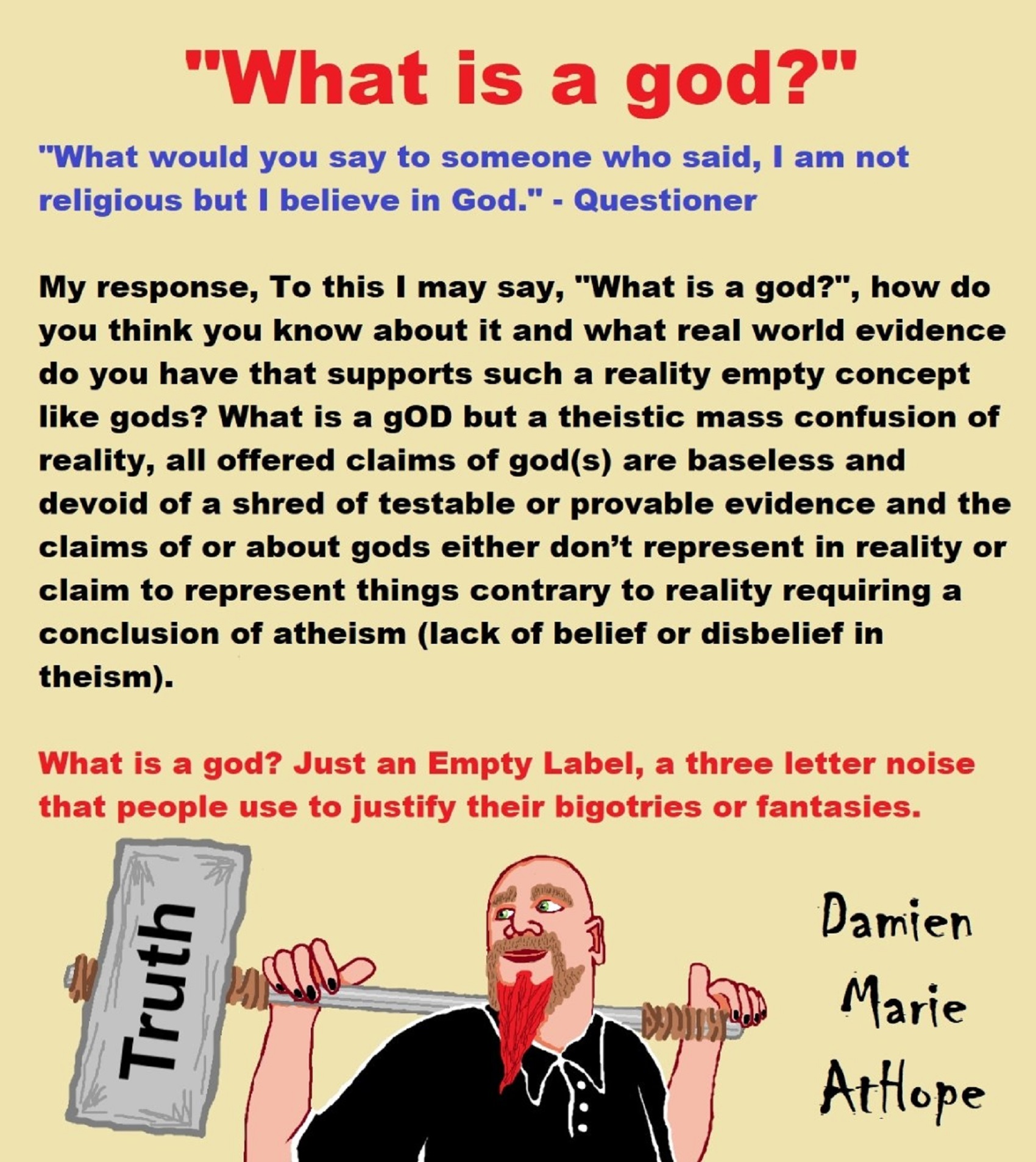
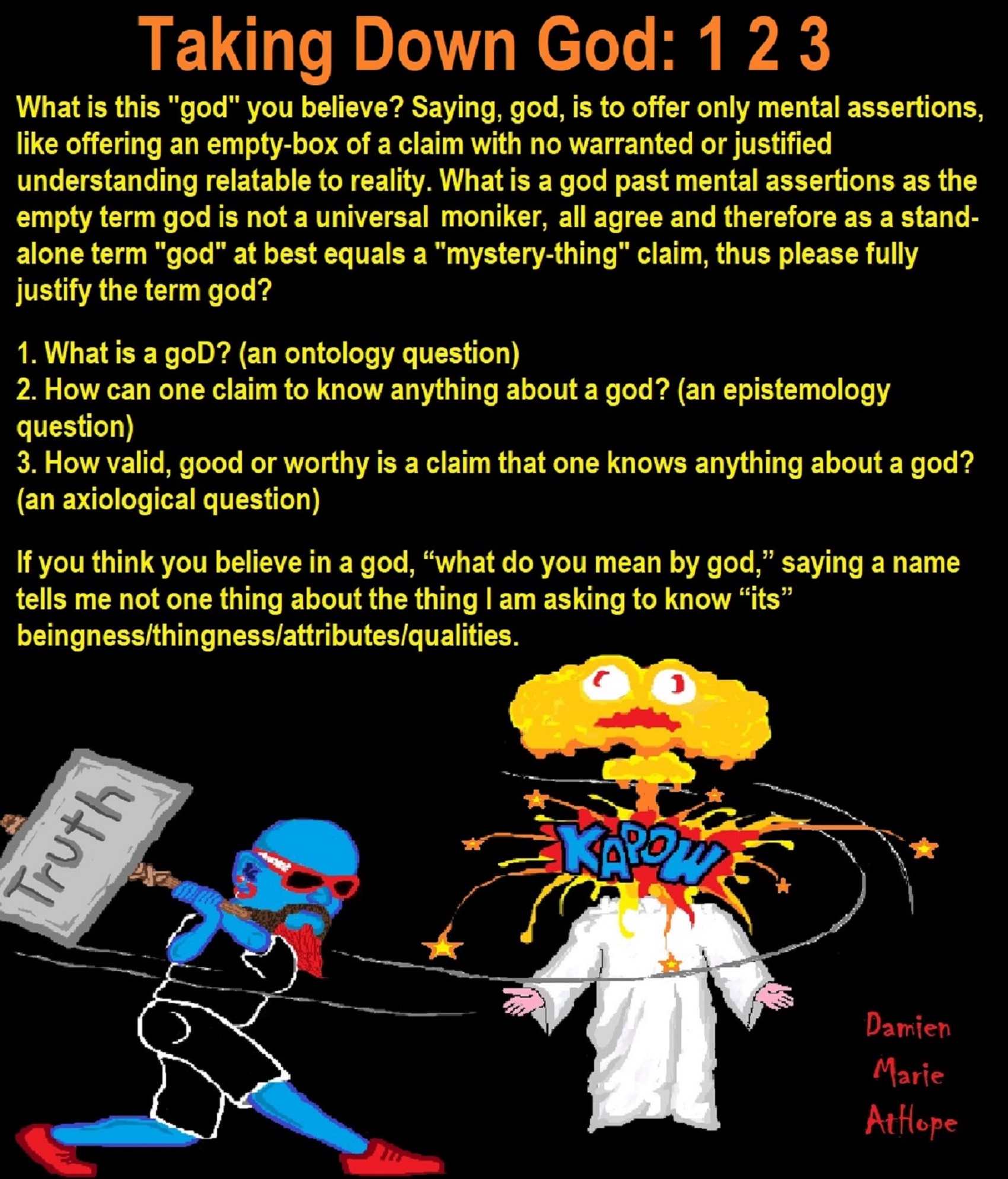
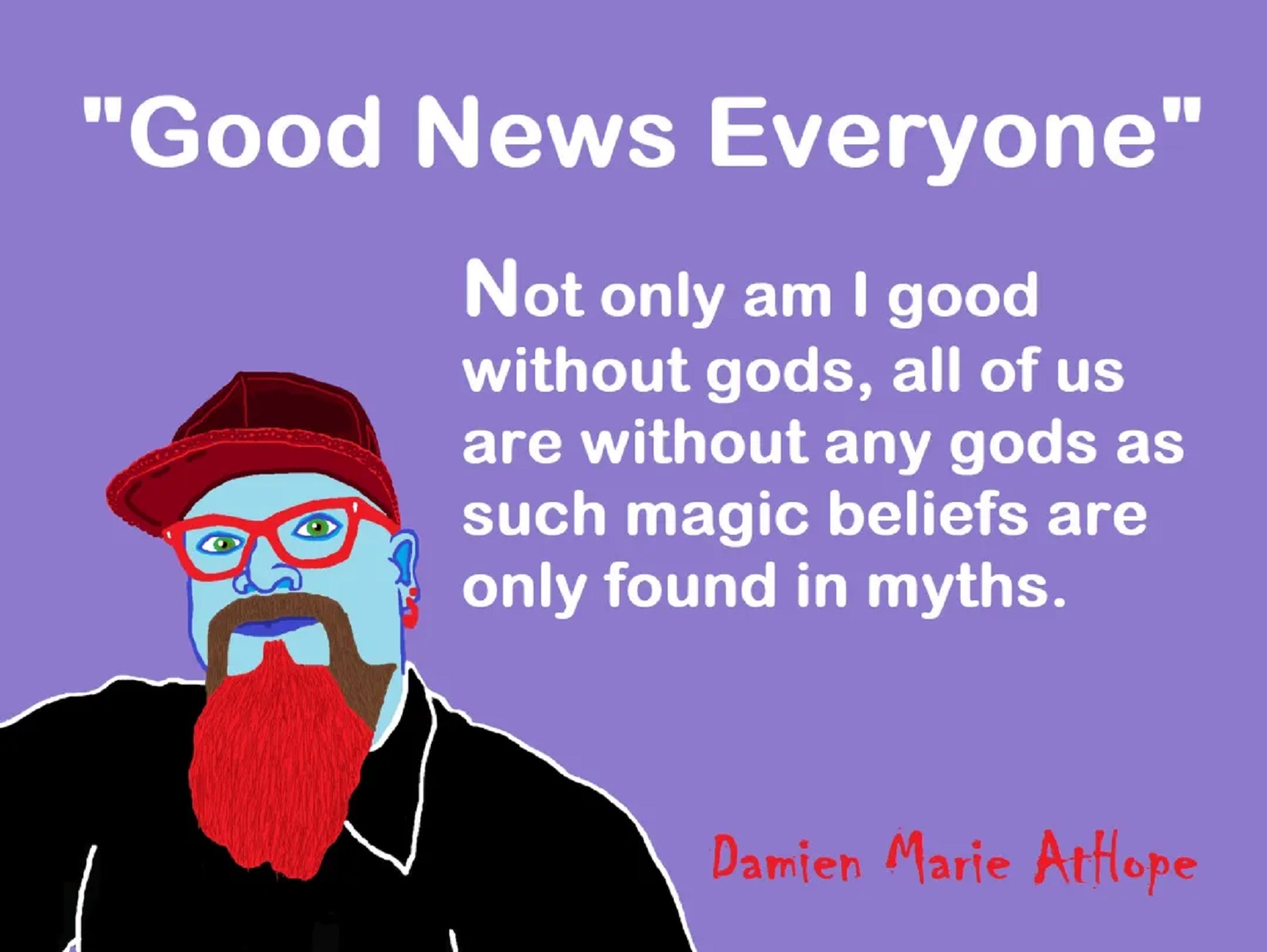



“Theists, there has to be a god, as something can not come from nothing.”
Well, thus something (unknown) happened and then there was something. This does not tell us what the something that may have been involved with something coming from nothing. A supposed first cause, thus something (unknown) happened and then there was something is not an open invitation to claim it as known, neither is it justified to call or label such an unknown as anything, especially an unsubstantiated magical thinking belief born of mythology and religious storytelling.

While hallucinogens are associated with shamanism, it is alcohol that is associated with paganism.
The Atheist-Humanist-Leftist Revolutionaries Shows in the prehistory series:
Show two: Pre-animism 300,000 years old and animism 100,000 years old: related to “Anarchism and Socialism”
Show tree: Totemism 50,000 years old: related to “Anarchism and Socialism”
Show four: Shamanism 30,000 years old: related to “Anarchism and Socialism”
Show five: Paganism 12,000 years old: related to “Anarchism and Socialism”
Show six: Emergence of hierarchy, sexism, slavery, and the new male god dominance: Paganism 7,000-5,000 years old: related to “Anarchism and Socialism” (Capitalism) (World War 0) Elite and their slaves!
Prehistory: related to “Anarchism and Socialism” the division of labor, power, rights, and recourses: VIDEO
Pre-animism 300,000 years old and animism 100,000 years old: related to “Anarchism and Socialism”: VIDEO
Totemism 50,000 years old: related to “Anarchism and Socialism”: VIDEO
Shamanism 30,000 years old: related to “Anarchism and Socialism”: VIDEO
Paganism 12,000 years old: related to “Anarchism and Socialism” (Pre-Capitalism): VIDEO
Paganism 7,000-5,000 years old: related to “Anarchism and Socialism” (Capitalism) (World War 0) Elite and their slaves: VIEDO
Paganism 5,000 years old: progressed organized religion and the state: related to “Anarchism and Socialism” (Kings and the Rise of the State): VIEDO
Paganism 4,000 years old: related to “Anarchism and Socialism” (First Moralistic gods, then the Origin time of Monotheism): VIEDO
I do not hate simply because I challenge and expose myths or lies any more than others being thought of as loving simply because of the protection and hiding from challenge their favored myths or lies.
The truth is best championed in the sunlight of challenge.
An archaeologist once said to me “Damien religion and culture are very different”
My response, So are you saying that was always that way, such as would you say Native Americans’ cultures are separate from their religions? And do you think it always was the way you believe?
I had said that religion was a cultural product. That is still how I see it and there are other archaeologists that think close to me as well. Gods too are the myths of cultures that did not understand science or the world around them, seeing magic/supernatural everywhere.
I personally think there is a goddess and not enough evidence to support a male god at Çatalhöyük but if there was both a male and female god and goddess then I know the kind of gods they were like Proto-Indo-European mythology.
This series idea was addressed in, Anarchist Teaching as Free Public Education or Free Education in the Public: VIDEO
Our 12 video series: Organized Oppression: Mesopotamian State Force and the Politics of power (9,000-4,000 years ago), is adapted from: The Complete and Concise History of the Sumerians and Early Bronze Age Mesopotamia (7000-2000 BC): https://www.youtube.com/watch?v=szFjxmY7jQA by “History with Cy“
Show #1: Mesopotamian State Force and the Politics of Power (Samarra, Halaf, Ubaid)
Show #2: Mesopotamian State Force and the Politics of Power
Show #3: Mesopotamian State Force and the Politics of Power (Uruk and the First Cities)
Show #4: Mesopotamian State Force and the Politics of Power (First Kings)
Show #5: Mesopotamian State Force and the Politics of Power (Early Dynastic Period)
Show #6: Mesopotamian State Force and the Politics of Power
Show #7: Mesopotamian State Force and the Politics of Power (Sargon and Akkadian Rule)
Show #9: Mesopotamian State Force and the Politics of Power (Gudea of Lagash and Utu-hegal)
Show #12: Mesopotamian State Force and the Politics of Power (Aftermath and Legacy of Sumer)

The “Atheist-Humanist-Leftist Revolutionaries”
Cory Johnston ☭ Ⓐ Atheist Leftist @Skepticallefty & I (Damien Marie AtHope) @AthopeMarie (my YouTube & related blog) are working jointly in atheist, antitheist, antireligionist, antifascist, anarchist, socialist, and humanist endeavors in our videos together, generally, every other Saturday.
Why Does Power Bring Responsibility?
Think, how often is it the powerless that start wars, oppress others, or commit genocide? So, I guess the question is to us all, to ask, how can power not carry responsibility in a humanity concept? I know I see the deep ethical responsibility that if there is power their must be a humanistic responsibility of ethical and empathic stewardship of that power. Will I be brave enough to be kind? Will I possess enough courage to be compassionate? Will my valor reach its height of empathy? I as everyone, earns our justified respect by our actions, that are good, ethical, just, protecting, and kind. Do I have enough self-respect to put my love for humanity’s flushing, over being brought down by some of its bad actors? May we all be the ones doing good actions in the world, to help human flourishing.
I create the world I want to live in, striving for flourishing. Which is not a place but a positive potential involvement and promotion; a life of humanist goal precision. To master oneself, also means mastering positive prosocial behaviors needed for human flourishing. I may have lost a god myth as an atheist, but I am happy to tell you, my friend, it is exactly because of that, leaving the mental terrorizer, god belief, that I truly regained my connected ethical as well as kind humanity.
Cory and I will talk about prehistory and theism, addressing the relevance to atheism, anarchism, and socialism.
At the same time as the rise of the male god, 7,000 years ago, there was also the very time there was the rise of violence, war, and clans to kingdoms, then empires, then states. It is all connected back to 7,000 years ago, and it moved across the world.
Cory Johnston: https://damienmarieathope.com/2021/04/cory-johnston-mind-of-a-skeptical-leftist/?v=32aec8db952d
The Mind of a Skeptical Leftist (YouTube)
Cory Johnston: Mind of a Skeptical Leftist @Skepticallefty
The Mind of a Skeptical Leftist By Cory Johnston: “Promoting critical thinking, social justice, and left-wing politics by covering current events and talking to a variety of people. Cory Johnston has been thoughtfully talking to people and attempting to promote critical thinking, social justice, and left-wing politics.” http://anchor.fm/skepticalleft
Cory needs our support. We rise by helping each other.
Cory Johnston ☭ Ⓐ @Skepticallefty Evidence-based atheist leftist (he/him) Producer, host, and co-host of 4 podcasts @skeptarchy @skpoliticspod and @AthopeMarie
Damien Marie AtHope (“At Hope”) Axiological Atheist, Anti-theist, Anti-religionist, Secular Humanist. Rationalist, Writer, Artist, Poet, Philosopher, Advocate, Activist, Psychology, and Armchair Archaeology/Anthropology/Historian.
Damien is interested in: Freedom, Liberty, Justice, Equality, Ethics, Humanism, Science, Atheism, Antiteism, Antireligionism, Ignosticism, Left-Libertarianism, Anarchism, Socialism, Mutualism, Axiology, Metaphysics, LGBTQI, Philosophy, Advocacy, Activism, Mental Health, Psychology, Archaeology, Social Work, Sexual Rights, Marriage Rights, Woman’s Rights, Gender Rights, Child Rights, Secular Rights, Race Equality, Ageism/Disability Equality, Etc. And a far-leftist, “Anarcho-Humanist.”
I am not a good fit in the atheist movement that is mostly pro-capitalist, I am anti-capitalist. Mostly pro-skeptic, I am a rationalist not valuing skepticism. Mostly pro-agnostic, I am anti-agnostic. Mostly limited to anti-Abrahamic religions, I am an anti-religionist.
To me, the “male god” seems to have either emerged or become prominent around 7,000 years ago, whereas the now favored monotheism “male god” is more like 4,000 years ago or so. To me, the “female goddess” seems to have either emerged or become prominent around 11,000-10,000 years ago or so, losing the majority of its once prominence around 2,000 years ago due largely to the now favored monotheism “male god” that grow in prominence after 4,000 years ago or so.
My Thought on the Evolution of Gods?
Animal protector deities from old totems/spirit animal beliefs come first to me, 13,000/12,000 years ago, then women as deities 11,000/10,000 years ago, then male gods around 7,000/8,000 years ago. Moralistic gods around 5,000/4,000 years ago, and monotheistic gods around 4,000/3,000 years ago.
To me, animal gods were likely first related to totemism animals around 13,000 to 12,000 years ago or older. Female as goddesses was next to me, 11,000 to 10,000 years ago or so with the emergence of agriculture. Then male gods come about 8,000 to 7,000 years ago with clan wars. Many monotheism-themed religions started in henotheism, emerging out of polytheism/paganism.

Damien Marie AtHope (Said as “At” “Hope”)/(Autodidact Polymath but not good at math):
Axiological Atheist, Anti-theist, Anti-religionist, Secular Humanist, Rationalist, Writer, Artist, Jeweler, Poet, “autodidact” Philosopher, schooled in Psychology, and “autodidact” Armchair Archaeology/Anthropology/Pre-Historian (Knowledgeable in the range of: 1 million to 5,000/4,000 years ago). I am an anarchist socialist politically. Reasons for or Types of Atheism
My Website, My Blog, & Short-writing or Quotes, My YouTube, Twitter: @AthopeMarie, and My Email: damien.marie.athope@gmail.com

